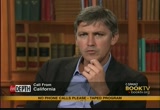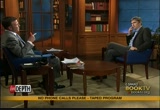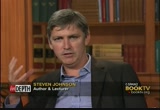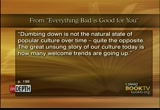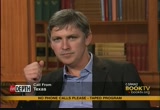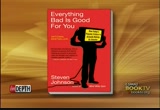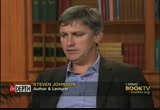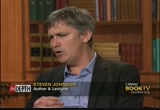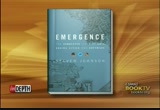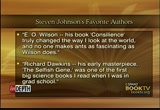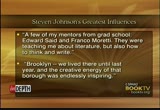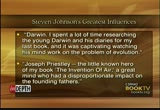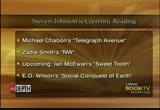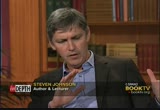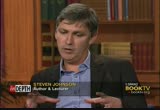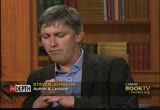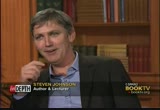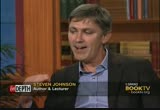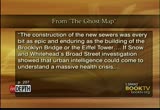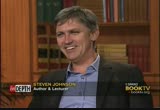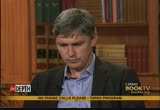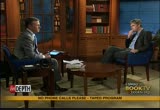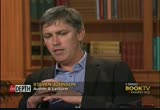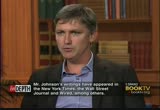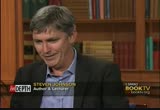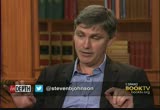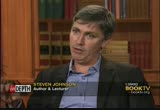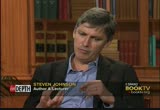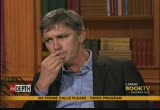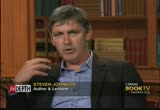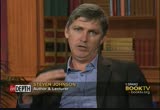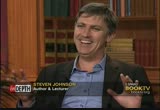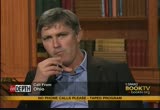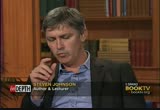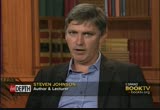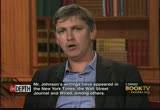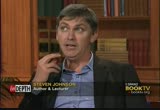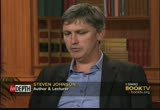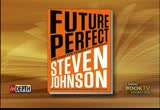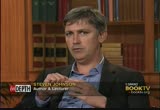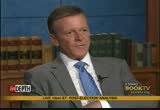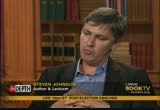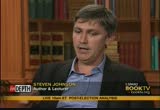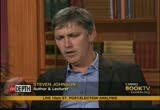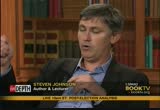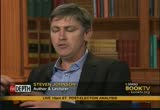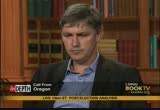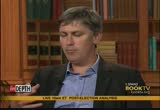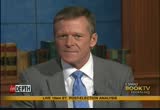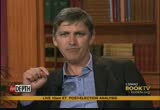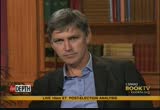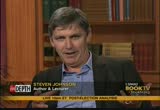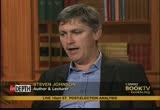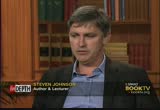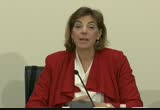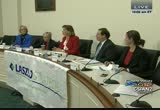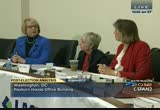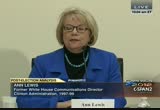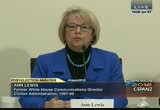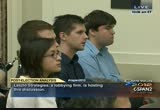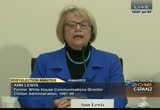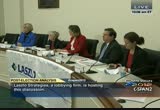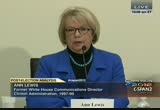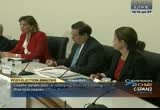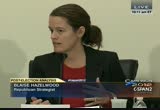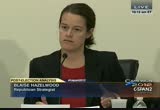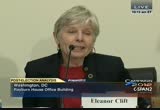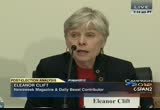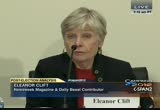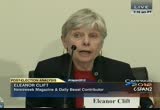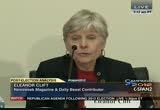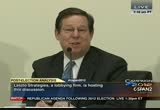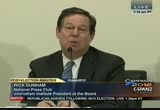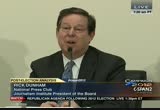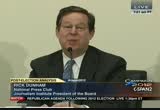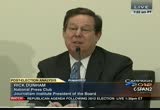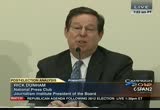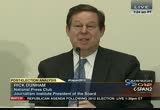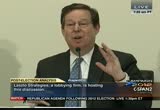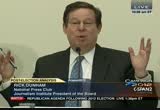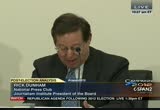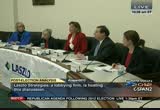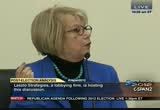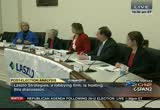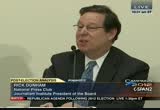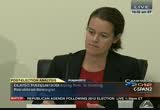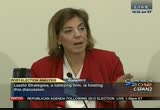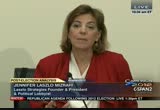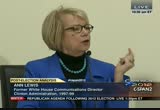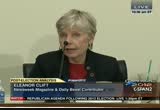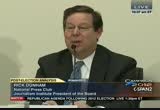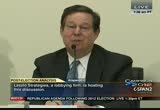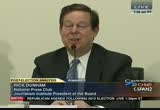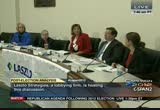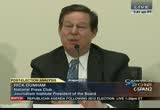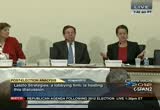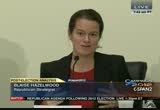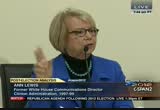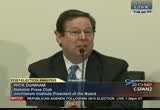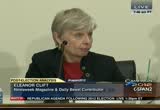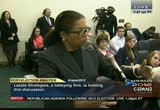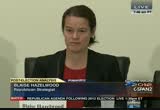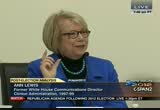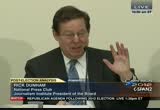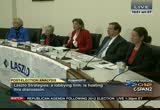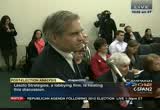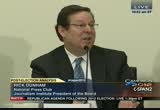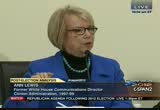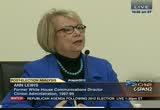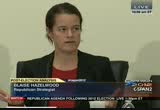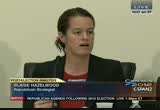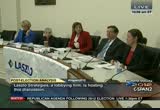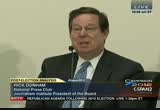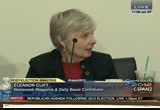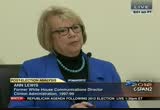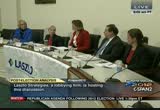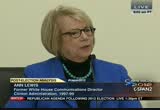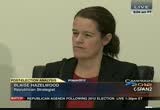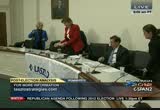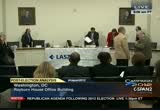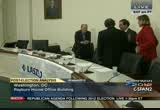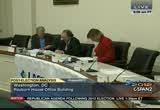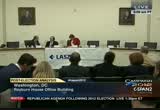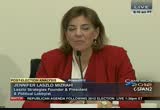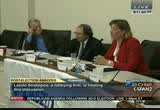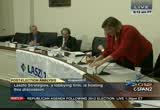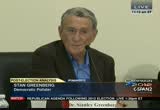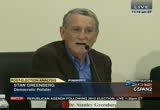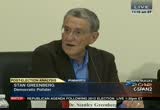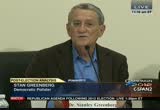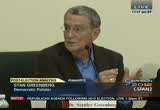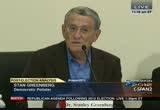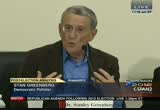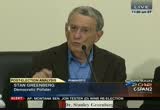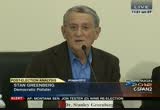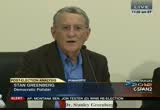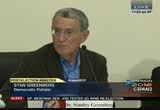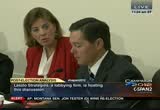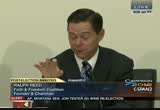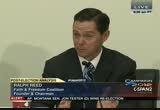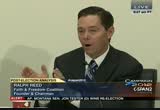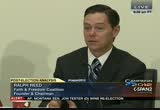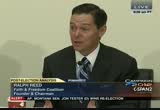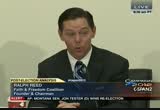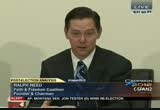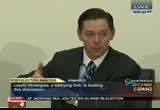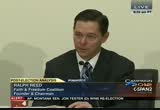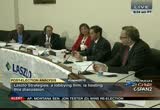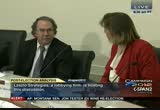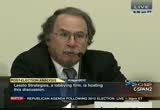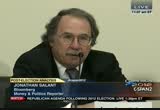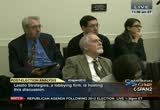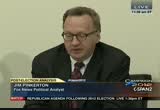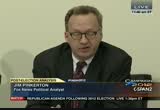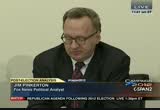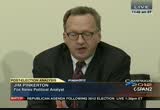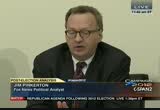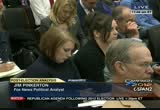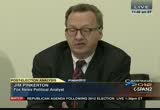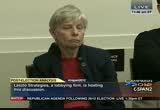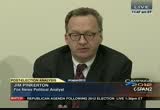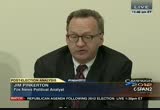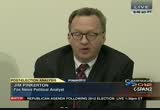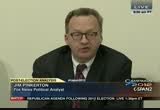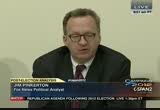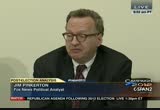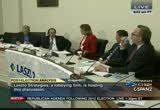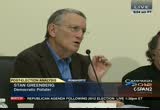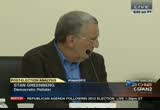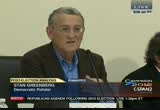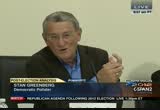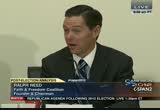tv U.S. Senate CSPAN November 7, 2012 9:00am-12:00pm EST
9:00 am
on the stanford test of twice. a lot of them scored 200, and they are supposed to be average kids. you know, this kind of thing is not -- this is like 30 years ago that he did this. it just hasn't taken hold. he has written books and put them all over the world. >> host: so you are saying that children were dumbed down by what? >> caller: it is done by matt. >> host: how are they being dumbed down? >> caller: just doing the numbers like seven and five -- the numbers for children, it dumps them down. by 80 iq points. it is scientifically proven. he took average children over 25 years in these really good
9:01 am
experiments. >> guest: i'm not familiar with that experiment, but it's worth mentioning here a big name of everything that is good for you. it is a fascinating, long-term trend, which is all around the world. it is the long-term trend, industrialized ascites or iq points to improve -- iq scores to improve over time. this is the documented study in iq. the debate about why it is happening is where there is real debate. i kind of argue that there is a possibility that the kind of
9:02 am
thinking that one has to do in advanced technology situations and advanced communication would tend to translate into higher iq scores on a test, because there is similarity in the kinds of problems that you have to solve on an iq test. i think this gentleman has written about this quite a bit, and there is an increased problem-solving exercise that you have from technology and other forms. and of course, you take more tests, which is important. one hundred years ago, did not take as many tests. it may be a little bit of an echo effect. it was when you measure it by iq, again, as i said before, iq is not the full story of intelligence. there are a lot of other different connections to it. but we do know that each generation has been getting smarter on an iq level for quite some time now.
9:03 am
>> host: and in fact, the book "everything bad is good for you: how today's popular culture is actually making us smarter", he writes the great unsung story of our culture today is how many welcome trends are going up. anthony in san antonio, texas. you are on booktv with steven johnson. >> caller: good morning, mr. johnson. let me just say what a distinct pleasure it is to talk to you. i want to say in 2005, i was a counselor educator and i taught a continuing education class counselors throughout the san antonio community. believe me, i used your book, the looks were bewilderment and total aggravation. the title freak them out. learning is prefigured. the kids were teaching me. i didn't know anything about
9:04 am
computers. how are we going to use it to guard against plagiarism? this had nothing to do with it. the resistance, as the time went on, and when i wrote my little blurb on amazon at 11 responses, only two people agreed with it. so this resistance among practitioners had to be tremendous. when the little kid wrote the iphone initiative about two or three years ago, and i played that in one of my classes, the ones over 45 and 50 years old work against it. but the younger ones were part of the global village and they were connected like an umbilical cord. so we are getting better at this >> guest: i'm glad the book was helpful. thank you. two things come to mind. when i wrote everything that was good for you, in my book
9:05 am
"everything bad is good for you", one thing was in the writing of it is that i had a couple of distinct audiences in mind for that book. a lot of that is trying to get that book right is about managing these different imagined readers in my head as i was writing it. so i wanted to write it in part for teachers and educators and people who were thinking about the media. so that would touch that academic context. i was also writing it took senior olds who were having a fight with their parents over how much time they should be allowed to play video games and giving them almost a bit of a generational book that they could resonate and connect to and it would sound like someone was finally understanding what they were doing with their media. trying to get the balance right is always a tricky thing with the writer. the other thing i tried to do with my book is -- we always approach a new technology with the kind of biases of how the old studies to work. i had that, too.
9:06 am
the technology that i grew up with. networked games, which i really didn't play the kid, why would you want to play games with all these other people. but with games, one of the things that i did was this little imagination trick. of what would it be like if james had come before books, and kids have been playing video games for like 300 years, all of a sudden, books were invented, and that was the new trend. all of the kids were crazy about. you know, reading books instead of playing games. it was something like, you know, these kids, they are reading books and it is just words. it involves images and sounds and decision-making, and these kids are just -- they can't make choices, they are being forced to be passive and follow the
9:07 am
storyline of other authors, which is going to create a generation of not leaders but all who are just followers. and that exposed all these dyslexic kids for books came along and you go to the libraries and the children are just sitting there, just sitting alone in silence at these little books, and what a horrible thing for our kids. obviously, i did not believe that, and i'm a big believer in books and i write books for a living. but it was a way of trying to get people to understand that health default prejudice is real and important that we have to understand that the new technology has its own opportunities and benefits as well. >> host: we are talking with steven johnson. beginning in 1999, his book first came out "interface
9:08 am
culture", followed by "emergence" and "mind wide open." in 2005 "everything bad is good for you" came out. "the ghost map" came out in 2006, and in 2008 "the invention of air", and in 2010 "where good ideas come from" came out. in his newest book on the market, "future perfect" is the name of that book. we always ask our authors on this program about what they are reading and who they have as influences. little tidbits of fact. we want to show you that right now. ♪ ♪ ♪
9:13 am
9:14 am
again, he was again part of the great thinkers having a lot of hobbies. he was a doctor in london in the middle of the 19th century. he was just a local physician was working with the poor, which at the time, one of the poorest and most densely populated neighborhoods in all of london. and he did a number of side projects. he didn't breakthroughs in anesthesiology as a hobby. but the big thing that happened is that one of the great mysteries at the time, what was causing cholera, which was a great 19th century killer. so these outbreaks would occur that would kill 20,000 people. at the time, over the course of the summer, and of course, he
9:15 am
got interested in 1848 or so, and at the time, the authorities were convinced that people were breathing in something that was noxious in the air that was causing it and they would get sick and die. this is one of the great medical mistakes of the period. cholera, we now know is in the water and it comes from contaminated water supply. so we have this cool crucial problem. we were looking for infectious agents in the wrong place. so in the late 1840s, he began to do his own investigation. eventually, in the late summer of 1854, an outbreak corrupted in his neighborhood, which went on to become the most concentrated and terrifying
9:16 am
outbreaks of cholera in the history of england. but courageously, because this happens, he decided to investigate it as it was happening. he started going around, knocking on doors, people had been carried down the street and had been piled together. he ends up collaborating with the local vicar who had been completely ignored and he began to build a case and build a map, which is where the title, "the ghost map" comes from, it shows there is a very strong collection of debts right around this public watering hole where people would get their water at 40 broad street at the center of soho. based on that map, the
9:17 am
authorities were convinced eventually that the miasma theory was wrong. what has happened here was that it had gotten contaminated and over time the authorities came around that one of the greatest achievements of the 19th century -- by 1866, thanks to mr. snow's detective work, cholera is gone from london for good, never to return again. twelve years after the operate. it is a story of a mind to change the world, collaborating with a very different kind of mind that changed the world. but it is the one book that i wrote as a kind of a thriller. so what has this kind of narrative that i can say was incredibly fun to write.
9:18 am
because of this, it has this quality, which i can say, none of my other books have. >> host: was john snow celebrated for his achievements? >> there are some people who recognize it yet but he died in 1958, just four years later. when you write nonfiction, when you write history, when you really want something to be true but you can't prove it, you really want something to be true, and you can't find evidence of it, with apple, i really wanted mr. snow and mr. whitehead to develop a great friendship in the middle of this terrible outbreak, which you would want this great bond. for a long time, but couldn't
9:19 am
find any evidence of it. until finally, i discovered this obscure little autobiography that whitehead had written. he lived to 80 or 90 or something like that. he willed his autobiography and it was in the new york public library. i couldn't find it in new england. but i found it in the new york public library. sitting there in the room, there is a line in reading this book, that says we run is tremendous adventure together and ever after, a portrait of john snow has hung in my library to remind me of that momentous week we spent together and how it changed all our lives, and how i look up to him. and i really started tearing up in the library. because they were friends, after all, that is one of my all-time great research stories.
9:20 am
>> host: in your book "the ghost map" committee right that the construction of the new sewers was every bit as epic as the building of the eiffel tower and the brooklyn bridge. if their investigation show that urban intelligence could come to understand the health crisis, sewers proved that you could do something about it. >> guest: yes, there is an urban infrastructure appreciation but i think we need to have more of. one of the best things about it, for me as an author, after the book came out, you have google alerts were somebody writes a review about him, i started getting the reviews from people who were uploading the photos from their vacations and they were saying, here we are in london on vacation visiting the site of "the ghost map" or the sewers that we read about in "the ghost map", and i thought, if you are in lifting people
9:21 am
like that come you have something going on. >> host: if you would like to talk to steven johnson, dial in on the numbers on the screen. or you can contact us at twitter.com apple tv and you can send an e-mail at booktv@c-span.org. marie is in georgia, you have been holding patiently. please go ahead. >> caller: i have a very enthusiastic mind. i know who the self-taught people are just me. if you asked me any topic, i usually know there are four or five people that control the topic, and i just wanted to -- i
9:22 am
watch how fast you learn. you are a speed burner and into information and how did this come about? i saw the people who influence your life, and i'd love to hear you talk more. >> host: to say at the beginning that you learned to read when you were 31 years old? >> caller: yes, i had brain damage. i am 75. but i have all apple computers, have six of them. >> host: what was that like you to go through as a young adult not knowing how to read? >> caller: hanging around four-point oh students, they will help you. the teachers will get offended because you don't do what they say when they say it. but the four-point oh people are really kinder to you. i always hung around the top
9:23 am
people. >> guest: thank you for calling in. the idea of finding the top people in the field, that part of what i get to do for a living, which is a wonderful thing, as my book, there is a kind of speed learning process to it. people at the very top of their field are very specialized. is that when you listen to them
9:24 am
talk about their work, they don't have a very good sense of what is most interesting to an ordinary person in their work. they are working at the very edge of their discipline. there is something they agreed that everyone knows is a given, now and now they are working on the new problems. you will have a conversation with them and you will see something in passing, and they will say, it's always fun to get to hang around with those folks and try to figure it out, what it is that they have underestimated the value of end translate that. that when folks like me can understand. >> host: how did you get interested in writing? >> guest: you know, i was always
9:25 am
very -- i always like to write. when i was in college and grad school, after that, i would have friends over and they would say that's really not very cool, stephen,. [laughter] when wired came out in 1993, i was in grad school at columbia. and here is this magazine and i was writing about technology as
9:26 am
a cultural force. we were really talking about where all this technology would take us. where we could combine the cultural and historical stuff that i was studying in grad school, and state-of-the-art technology that was so interesting. at a certain point i started realizing the last 50 books that had been held in science books. i had kind of a mediocre background in it, and my parents are still making fun of me because they say that we saw your high school biology grades and you are not a good biology student. i was getting more and more interested in the science side of things. and i thought, maybe i will try my hand at popular science. so there are diverse influences, the three rivers of interest to
9:27 am
science of creating and converging to books that are funny. >> host: will be read on a regular basis? via technology? when you think of technology? [talking over each other] >> guest: sure, those guys are wonderful. at one point we were talking about before, which was an earlier call was talking about the echo chamber effect. and you keep track of folks that are similar to you and your taste. one of the things that i have found is that it is very useful for me personally about twitter, and i suppose you could do this with facebook, as i tried cautiously to follow a diverse mix of people. i follow a bunch of musicians and technology writers and architecture critics, and what i get out of that is not the 140
9:28 am
characters, but rather it's the wing that they are sharing on twitter about things they have read, which is a big thing. you know, it is pointing to a 6000 world new yorker article or something much longer or more substantial than just a tweet. it is that group that the determination of my random morning reading over copies before work -- that group has more control over what i read in the editorial boards of "the wall street journal." those people are often pointing to it. it's my little coffee house. my little diverse group of folks who are my guide through the day. i think that is a great use of social media. but you have to choose to have
9:29 am
an eclectic mix of people. you can't follow one group of people in one profession. >> host: we have someone who tweet ntu. how might higher education leverage some of your concepts to meet future needs of our society? >> there is a lot of interesting work, the concept of simulation, like i was referring to earlier. you know, one of the things that happens when you present information to students by simulation rather than a lecture or two reading a book is that they have a much more immersive understanding of the system that they are setting. so imagine they are studying a history class when the revolutionary war.
9:30 am
the court experience, which is assimilation of an entire kind of total situation. so you would supplement that with reading and the primary thing would be assimilating all the events that led to the revolutionary conflict. and so they would simulate the geopolitical tensions, the actual climate and topography that have impact on the military and the political movement there. all of that stuff can be done and modeled in software. the tricky part about something like that is that every now and then, the british would win. and so you have to have a mechanism we can tell about the students -- we can tell that this is what happened, the british didn't win. the students would get out of that a much more vivid and much
9:31 am
more tactile sense of what it was like to be let back on what the various pressures were from the different variables that went into that revolution. >> host: the next call for steven johnson calls from idaho falls. >> caller: hello, stephen, it seems to me that what you exhibit is a perspective of faith, and i don't know if you are really comfortable with that word or if you have questions to me about what does faith mean to me? >> host: roxy, explain what you mean. >> caller: okay, face to me is that which is not faith is a mistake. i am surprised when people don't come from a perspective of faith. it is electric and energizing.
9:32 am
>> guest: let's talk about this in a context of joseph priestley. because he was a deeply religious person and one of the things that he talked about in his works was the electric language and dealings of the sublime that one gets when you think about forward march of history and of progress. that was a big thing for him. you can imagine this is literally the work of god. society is growing more advanced, human beings are having more compassion. see that progress marching along a something that was much bigger as an individual, having a feeling of being moved along by
9:33 am
something and participating in that movement, it is a deep and profound part of the human condition. one of the great experiences, intellectual and emotional experiences that you can have is human. i absolutely do believe that. there is an element of faith to that. it is probably not the word that i would use, but that element of wanting to something larger than yourself that is taking you to a better place of some kind it is a sentiment that i think we need to have more of in society and institutions that encourage that kind of feeling in human beings are institutions that are valuable to us. i think you can have that feeling and encourage more people to have that feeling by telling stories that come from secular roots and the understanding of science and the
9:34 am
social sphere, or in some cases, technology, one doesn't necessarily have to start a revolution in a traditional sense. but that feeling of the sublime but there is something larger than you, that is great. >> host: do you get that question often, steven johnson? >> guest: i don't get it quite as often with other books, but i do get it for this book. the technology version, the similarity, which is kind of like a technology future that we are headed towards, the point in which machine intelligence will advance to the point where it exceed human intelligence and we can lose control over the machines on some level. this is either a dystopian idea is in the terminator movies were a utopian idea for filing, things will be smarter and
9:35 am
smarter than humans and let them solve the problems of society. that is the new kind of rhapsody in tech circles. i do get asked about that a little bit more. >> host: steven johnson is our guest. we have about an hour left in this month special "in depth." rob in ohio, you were on with steven johnson. >> caller: thank you so much. it is a pleasure to speak with you, and mr. johnson. if i could just take a moment and divert my attention to peter slen. i want to say your professionalism as far as all the booktv interviews do is wonderful. my appreciation. >> host: you are very kind. ..
9:36 am
9:37 am
to write small, set lessy, but ambitious goal state today goodo regularly.ite, when when i'm in the middle of the book and sometimes i'll have i t period when not writing but whed i'm writing a book, i try to day. 500 words a and i tried to do it in the morning words? >> guest: 500 words, it's about a page, maybe a page and a half. yeah, sorry, writers think in words which i realize most people don't. it's like a short op-ed. you know, an op-ed in a newspaper would be 500-1,000 words, something like that. so i try to write 500 words a day, and, you know, that's not -- if i know what i'm working on, i can sometimes do it in 25 minutes. sometimes it takes me three hours, it depends how hard it is and how much i have to fill in. and if i do a little extra, that's great, but i try and just get that done. and if you do that every day,
9:38 am
you don't wake up in the morning and go, oh, my gosh, i have to write an entire chapter today. and if you do that for three, four, five months, you've got a book. i mean, it adds up to enough words for a book. now, the one thing that i try and do, kind of a weird technique i've developed over the years is i don't reread the chapters as i'm writing them. so when i sit down in the morning and i'm in the middle of a chapter, i'll briefly reread so i remember where i was, and i'll start writing the next 50 words, and then i'll sit down and reread the whole chapter once, do an edit on it and then put it away, and i won't reread the chapter until i'm done with the entire book. and the reason i do that is because the sendty is to reread. by the time you're done with the
9:39 am
book, you have read the thing 50 times or, you know, a hundred times maybe, and you're so bored of it, and everything seems so obvious and predictable because you've read it so many times that you can't tell what's working and what's not. so when i sit down to read the whole book having only read each chapter through once, i can really read it with fresh eyes, and often times i find that i've repeated myself word for word at two points in the book because i'd forgotten that i've written one section here, and then i showed up and wrote that exact same section somewhere else. so there are a lot of mistakes, and it's noisy, but i get a sense of what's flowing. i read it almost as if i've never read it before. and it also helps me write faster. so that's my technique that i've developed. >> host: steven johnson, where do you live right now? >> guest: we've just moved, for a couple years, a little california adventure, to mar run county, california, after being
9:40 am
in manhattan or brooklyn for 21, 22 years. >> host: why'd you move out there? >> guest: we wanted to try something different. our kids were at a nice age where they were out of diapers, but today didn't yet have girlfriends -- [laughter] and we have three boys. and we have this nice thing where we can kind of live anywhere because we have a lot of flexibility. i don't have to go into a office, my wife -- who used to work at mtv -- isn't working there now. and so -- >> host: may we ask who your wife is? >> guest: my wife is alexa robinson, she was a producer at mtv. she wasn't a vijay. >> host: okay. >> guest: and she -- and so we wanted to try and go on some kind of adventure with the kids to take advantage of the fact that we can live anywhere. and i've always loved northern california, and i have a lot of friends out there. because of all the technology projects that i've been involved with and things that i've
9:41 am
written about, you know, it was helpful professionally to be out there for a while. so we've been off on this adventure for a year now. >> host: john in bellingham, washington, good afternoon. please go ahead with your question or comment for steven johnson. >> caller: hi, pleasure speaking to you. 8, i was a first wave environmental planner back in the mid '70s, so i'dhead of your ghost -- i'd heard of your ghost maps story. and in -- after i graduated i thought i'd kick around the idea of architecture plus ecology and play with computer models and satellite data late at night without authorization. [laughter] before the term hacker or geospatial intelligence technology was invented. anyway, i became a mr. mom in '82 because that was really going nowhere. today, however, it looks like, you know, cloud technology and c factor computing and a lot of
9:42 am
these breakthroughs are going to make three dimensional environmental computing feasible. the problem i saw then was a global vision in a flat world, you know? we didn't really have a three dimensional philosophy. to work with this new technology. and i don't even see it there now. and it's kind of a little troubling, you know? any comments, thoughts? thanks. >> guest: yeah, great. what an interesting background. so here's, here's what i would say. this is something that has really started to -- i've been thinking about it a bunch since future perfect came out. so the power that we have now thanks to the kind of peer network collaboration that i'm talking about in that book is we now have all this data that we can gather, we now have the ability for far more people to participate in identifying the
9:43 am
problems in society whether it's environmental problems, whether it's things that aren't working in cities, whether it's things in goth. government. so there's a lot of opportunity, i think, for a new and much more optimistic vision of how we can make the world a better place and for kind of a new political framework there. and, obviously, that's the core of future perfect, is kind of a celebration of those opportunities and telling the story of those opportunities. the question i have, and it is genuinely a question, is as powerful as those kinds of network systems are, are those decentralized forms of collaboration capable of long-term thinking? because, you know, when we think about environmental issues, um, and we think about even urban planning, you know, oftentimes the most important role that traditional states and governments are going to have is their ability to kind of look
9:44 am
out on the 10-year scale or the 20-year scale or the 50-year scale and say, okay, we don't necessarily need this bridge right now, but we know we're going to need it in ten years, and we've got the money, so let's build it now so we're ready for it in ten years. or we have to think on that long-term scale. and we know that this is one of the limitations of markets, is that the private sector tends to think kind of quarter to quarter. and thinking ten years in advance is something that, you know, you've got to be crazy to do that. and so i hope that there's a way many which we can build these kind of peer networks that will be capable of thinking in that long-term way. but i'm not sure if that's possible, and that may be always an important role, kind of traditional planning, top-down planning for all its limitations, that kind of planning still has a vital role to play precisely because it can look 50 years in the future. >> >> host: well, mr. johnson, is it fair to say that "future
9:45 am
perfect" is kind of your dense network of human intelligence, that because of your previous books "future perfect" came about? >> guest: yeah. you know, they all -- not all of them, but most of them have this theme about, you know, kind of as i was talking about before, group collaboration, diverse interests coming together, jumping kind of from field o field, the power of kind of an open platform. that's a big theme of "emergence," it's a big theme of "ghost map" and "invention of air." and so i feel like "future perfect" was always sitting there in the background, um, in the sense of a political philosophy, right? so those books were never really about the world view of, you know, what are the institutions that could make the place -- make the world a better place. they were stories about heroic people from the past or locking at technology or the question of innovation. but really when i was at the end of where good ideas come from, i
9:46 am
realized everything i was arguing for in that book was impolice -- implicitly a world view. and if you believe in group collaboration, you're not exactly fitting in the democratic party or the republican party. and there budget quite a slot for the people that i was most inspired by. and that's, and that's really why i sat down to write "future perfect." it was fun because it's the first openly political book that i've written. but it seems, for my sake, most political groups seem to be just for one side saying nasty things about the other side and vice versa, so it's funny to write a political book that actually is, one, upbeat and, two, trying to figure out a way -- trying to figure out a way to present a third alternative that is not just kind of squishy centrism. i'm just saying we want a little of the left and the right and we'll be moderate. no, there's an additional set of tools here that are not just big
9:47 am
government. and we have an opportunity now to really put those tools to work in this a new way, and we should be excited about that. >> host: well, poor richard d.c. has tweet inside a couple of different tweets, but his latest is, what is the 311 equivalent for our politics? and he also sent in a tweet that said is there innovation in politics? >> guest: yeah. >> host: rather than government. >> guest: great question. so one of the things that i talk about in "future perfect" is, um, you know, major problem we have right now is campaign finance, right? that we have, again, a betrayal of those values of diversity that happens in terms of the way that campaigns are funded. so, you know, you have a tiny, tiny slice of the population that is funding these super pac and maxing out their campaign. this slice of the population makes the 1% look like the proletariat. so the whole political system is
9:48 am
oriented around this very small number of donors or big corporations or big unions that contribute to these capables. and so you -- campaigns. and so you don't have enough perspectives shaping the kind of values of the politicians because they're so dependent on the money. now, the traditional kind of left-wing argument is you just have public funding of the campaigns and take all that private funding out of it which is complicated, and you probably would have to have a constitutional amendment to make that happen. but a few folks who are really some of my heros, larryless ig and a few other people, have proposed this other system which is they call it democracy vouchers. and it seems to me it's a great embodiment of the kind of peer progressive ideals which is to say don't just have the state take over the campaign, that would be too top-down. the campaign finance. give everybody $50 of their taxes that they're going to pay or give them a tax credit if they don't pay taxes, and let them spend that $50 on any candidate that they want or on
9:49 am
any party they want. and they can add $100 to that, um, if they -- with their own money if they want. if they don't specifically earmark their money for a candidate or a party, then that $50 goes to the party they're registered with, um, and if they aren't registered with the party, it goes to support the mechanics of the elections. and any candidate, that would create this giant pool of money. and any candidate who wanted some of that money would be able to get it as long as they, basically, swore off any other kind of funding. so it would be entirely opt-in, but it'd be so much money that people would opt into it. and that would have this process of diversifying the greater number of contributors financially to the campaigns, which would be great, and it would mean that, you know, people weren't just sitting there chasing big donors and having all these cocktail parties and big benefits all the time which is a waste of their time, and it gets bad results in politics because they're listening to a small number of people, and they're not governing when they're going out
9:50 am
raising all this money. so i think it's those kinds of solutions, they're somewhat ambitious, it's hard to figure out exactly how we would build them, but at least we should have a model that we can point to in society and say this is how it would be better, and this is how we can improve things, and we can at least try and figure out how to steer the ship of state towards these goals instead of just having this feeling that gridlock is inevitable, and the political system doesn't work anymore. >> host: david in eugene, oregon, thanks for holding. please go ahead with your question or comment. >> caller: hi. this is for mr. johnson. it's two things. one, i'm wondering what steps a person could take day-to-day to encourage cultural progress, and the second is what could the "in depth" program do to incorporate the pure network model? let's say after we have a chance to read your book or some of your books, e-mail in with some thoughts and maybe months from
9:51 am
now there could be a follow-up program where you respond to some of them? or do you have any ideas how to incorporate the model? >> guest: well, those are good ideas right there, i mean, i like that. it feels very just right now it's so fun to just be having these conversations live. so there's an actual conversation happening, which is great. but, yeah, the opportunities with books, books are interesting because, you know, fundamentally they are a one-to-one conversation, a one-way conversation, really, between an author and a reader x. they remain this kind of strangely private act in society, and increasingly kind of public society there's this weird intimacy you get as an author where you talk directly to your readers. but there is a lot of interesting stuff happening now, but i'm helping a little bit with a service called findings that is trying to encourage people to do more social reading, where they're reading their book in private, but they can take quotes that they are
9:52 am
inspired by and share them with other people, they can see what other people are reading. and the opportunity to kind of go through and have this kind of open network kind of book club, um, where people are reading and discussing, and the author is part of that process, is the tools for that have never been more advanced than they are now. so there's a great, there's great opportunity there. um, and i've forgotten what the first question was. >> host: i did too. you know what? as soon as -- david, i've got to tell you, as soon as you did that, i just remailed the producer -- e-mailed the producer of this program, noted the time of your call, noted your name, said let's get his number and want to make sure that we follow up with that idea in some way as an open source, open network or do a follow-up with steven johnson. so you know what? i didn't even hear what mr. johnson said. [laughter] i usually listen, but i was following up on your idea immediately. >> guest: let me say one other thing particularly about "future
9:53 am
perfect," but this b has been true of some of you concern my books. you write books because you want to entertain people or persuade them of a perspective on the world, or you want to tell them a rich story and help them understand the world. some books are written that way. every now and then you write a book, and "future perfect" is one of them, where you're trying to encourage people to surprise you, right? [laughter] you're trying to tell them enough stories and give them a framework they can use, and the hope is that people will read "future perfect" and go out and then build a kind of peer network in some other facet of the society that i hadn't thought about at all, that wasn't on my road map at all, but five years from now i'll hear about it and say, that's fantastic, and you're so good for going and inventing that on your own. so maybe if this show is one of the first ones to do that, that would be all too fitting. [laughter] >> host: next call for steven johnson comes from keane in buoy, maryland.
9:54 am
hi, keane. >> caller: good afternoon, mr. johnson. i enjoyed reading the book, i bereave the title "where good ideas come from." >> sure. >> i happened to work in the hopkins physics lab. >> guest: oh, yeah, sure. >> caller: i know the doctors extremely well, and they immersed themselves with picking this happen from an idea. and part of it was that the team of people that know programming, it was an 1103a computer that had to determine the orbital primers for the thing, and the sub -- that three of my friends worked at at the community center. >> guest: how cool. >> caller: and myself and three others worked on the submarine program to capture the data and actually find out so they can help to keep the russians pinned down. and then there was one final person that did the injection of the or bittal primers. so an entire team effort, so
9:55 am
lean. that's a rather lean number, eight people did the entire thing. >> guest: right. >> caller: and that ooh helped get the entire thing done, in operation in four years, and, of course, the hybrid people were incredibly bright. and the total cost to the public was $300 million. we are extremely proud of that. but there's another one that's come up that's not known, and because of in your -- you were right about the atmosphere there. everybody talks to everybody about everything going at lunch. everybody few what was happening. but that same atmosphere happened when we had the fuel shortage in the '70s. and i believe another invention isover -- is of an extreme use, a chemist was involved in -- the lab was involved in all aspects, what would you do for the country in the '70s. any renewable energy projects and also with the fuels. and by 1980, everybody knew the fuel of choice for alternative would be meth follow. and it turned out a chemist was
9:56 am
in charge of our renewable energy effort. his name was dr. william avery. and he immediately saw what was coming out, and he was working on an energy thing that produces electricity in water in great numbers. and he said, oops, all i have to do is lek ri rise the water, and i got prodigious amounts of oxygen, hydrogen, and, oops, he made a test with a company, and they actually -- we didn't have the facility available, so on land he got where he had electricity and water, he ran a small test lab, if you will, of using for the common source or 25 tons of carbon a day to produce about 33 tons of methanol. the point of that was he made a huge jump, they used the standard way of doing it is with the coal slurry, and he looked at it and said that's not a good idea, we can be more efficient at getting car bomb. pulverized the coal. and sure enough, it jumped 75%.
9:57 am
the upshot of all this thing is invention is a pattern and, of course, available with the government. and you, sir, i think you would appreciate reading the book -- my surmise is his book, he has, unfortunately, died several years ago. but his book there describes, describes this thing. and the idea is we believe we can make methanol with this process that would be cheaper -- >> host: okay, keane, we got the idea. >> guest: that was great. thank you for that story. so keane was referring to in the first part the story that i tell coming near the end of "where good ideas come from" which is about this amazing collaboration at the applied physics lab in maryland where these two guys were kind of inspired by the launch of sputnik, um, which had
9:58 am
just gone up a couple days before, the first satellite sent up into orbit by the soviets. and they decided to kind of listen for it, basically, because they were like there's a thing that must be sending a signal, so they just, again, as kind of a hunch, as a hobby, it wasn't part of their official responsibilities. so they start to track this thing, and over time they figured out all these interesting things from the signals they were parse, and they eventually figured out they could locate it physically in space and figure out its orbit. and from that strange kind of unplanned investigation, the technology of gps, the navigation technology, developed. and it was originally used for military purposes. but, um, over time it's been opened up, and now here we are 50 years later, and all of us are walking around with gps devices in our, you know, pockets. and it shows you the power of that kind of innovation where because they were allowed to follow their hunch, even though they had no idea where it was
9:59 am
going to take them, it ended up going from being a tool for fighting the cold war for being a tool for us navigating in our cars and trying to find a coffee shop somewhere nearby. and that's, you know, when you create platforms that allow people to kind of invent on top of existing inventions as we've done with gps in so many ways over the last 20 or 30 years, that's a big driver of innovation in society. >> host: glenn, freeland, michigan. please go ahead. hi. >> caller: hi. thank you all very much. couple of fast questions for dr. johnson. one, does he think privacy or hack of privacy on the internet and stuff like that might ever lead to an orwellian kind of big brother situation? and, two, what does he think about the idea of cloning, especially the idea of human cloning? thank you again. >> guest: well, first off, i really want to thank you for calling me dr. johnson, but one of the things that happened when i started writing these books is
10:00 am
i never finished by ph.d., so i'm not a dr. johnson can which my 99-year-old grandmother who is watching this show, no doubt, is always teasing me about, that i never actually finished that ph.d.. so -- but i've written all these books, surely, i should get some credit for that. [laughter] anyhow, i, um -- what was the -- [laughter] i got distracted by that. >> host: privacy, and you closed "future perfect" on the issue of privacy and technology. >> guest: yeah, yeah. so, it's a really, really important issue, and we -- what's happened now is that we live in this kind of interesting realm where, um, the zone between the public and the private has gotten much blurrier. it used to be, you know, even when i was a kid there were people who were celebrities, who were politicians and who were famous and who live inside public, and then there was the rest of us. the rest of us lived private lives. and now it's possible for you to put something online and, you know, 100 people see it or 200
10:01 am
people see it or a thousand people see it. um, and so we have to make choices, and this is the kind of facebook problem of, you know, what is appropriate to share? you know, what do we enter into that kind of public domain, and what do we not? and it's comply candidated, and it's not easy. people make mistakes. it's part of the process is to walk through this with your kids. and the problem is that technology is advancing so quickly that it's hard to keep up with all the new ways that we have to share. the other part of it, which is what you were alluding to, is that there's a, you know, we've had some backlashes against kind of privacy and sharing in the openness of the internet and piracy. we will leave this now in rightd right now we will go live to generals posters and representatives from both sides of the clinical spectrum reviewing yesterday's election results and talking about the issues newly-elected leaders will face.
10:02 am
lobbying firm laszlo strategies is hosting this today. this is live coverage on c-span2. >> i would like to thank congressman read chairman for providing the room for us. he had a big upset win last night over congressman berman. i would like to thank congressman berman for his service to america hand and to congratulate the congressman who ran for office, whether they either won or lost last night. it's an incredible thing to have served or to be willing to serve. it's very painful process to go through negative campaigning, very hard on the candidate and very hard on their families and i think the american voters away greatest attitude to all who are willing to serve, whether they win or lose. i picked a very distinguished panel of folks to talk today from left to right. trying to make it convenient for you, i've seeded them in a way that i think is approximately from your left to right. so on my right and your left, i
10:03 am
am going to start with our first speaker at the way i'm going to do it as i'm going to very briefly introduce the speaker and then i'm going to ask them the same question which is about what happened in the election and what it means. we will spend about five minutes and go on to the next speaker and we are going to heaven opportunity to do a lot of q&a. this is going to be nonpartisan. we have both political parties represented from a wide range of views and so you will hear the broad-spectrum. i'm going to start with ann lewis. ann lewis is a mentor to me. she is a complete superstar and strategic communication. people know her as the former white house communications director under president bill clinton and also the shining light behind a political operation of hillary clinton. let me start with ann lewis. >> thank you. >> what happened and what does it mean for america?
10:04 am
>> they are still counting votes in florida and -- [inaudible] bears and even greener light. i apologize. i saw that little green light and you know, it was too subtle for me. here is what we know. we certainly know that the president was reelected and we know democrats have picked up seats in the house and the senate which is contrary to what anybody in washington i think god even as -- we know they house will stay roughly the same so with his breaking news i bring you know that returns from florida and i like to spend more time on why he did this happen and what does that mean for us going forward? first, i share the admiration all around for president obama's campaign team. they were technically close to perfect in the first responsibility of the campaign team and that is to identify and turn out voters.
10:05 am
they planned it, they executed it and every step of the way they knew what votes they needed and they went out and got them. they began weeks before election day thanking favorable votes in states where they have our people on the ground preplanned so again technically a superb operation and i think one that will set the standard for future campaigns as how you identify your voters, encourage them to turn out and some people will think by the fourth or fifth visit or phonecall -- but it did work. the point i want to make dionne that however because i think the technical aspects will get a lot of attention. i want to point out how much of it is actually policy-based. elections ultimately are about policies, not just about campaign techniques. the first policy that president obama clearly had a huge impact is the decision to go in there and rescue the american auto
10:06 am
industry. that is to use government funds to keep an american industry going. an example of what four democrats is an ongoing principle that government can be a force for good. government has not always the anomie. the rescue of the auto industry, very important and clearly throughout the midwest. the second policy that has direct electoral consequences was his decision to recount to what we now call the dream, young people who were brought to this country perhaps by their parents, did not have the appropriate papers were citizenship but were here, were americans and wanted to build a future. and they were hoping to go to college. the president announced an executive decision to suspend deportation to young people in this category with a very strong signal. share their hopes. he understood their aspirations. he welcomed them to america.
10:07 am
very important and as we see from the numbers from the hispanic community i think again understood and appreciated. the third is a cluster of issues around the question of women's health. while the affordable care act itself may still be unpopular, the provisions around care for women, health care for women, no more gender discrimination in payments, a series of preventive services like cancer screenings, like earth control are very popular. and so to the extent that republicans, beginning with their nominee, made it an issue that they were going to roll back these protections, these provisions they clearly again said to a lot of women, we are not on your side. in each of these, the auto industry reaching out to the dreamers, women's health, you had a symbolic way of, and a real policy-based way. we understand we want to be hopeful. the fourth piece i would say is the issue of marriage.
10:08 am
in maryland, equal marriage saying the right to marriage should be open to everyone no matter who they are or who they love. i don't think we fully appreciate how important that issue is as a civil rights issue to young voters. so when i look at the youth turnout and the margin that president obama guy with young voters i would say a smaller cluster of what they see as civil rights issues making college more affordable, and the bottom line again it may look to an outsider as if not much has change. we changed. we still have president obama and the democratic majority in the senate and republican majority in the house. but look at the people who could now be elected to congress. look not just at their faces but their life experiences and you will see i think a change that truly reflects the image in america. in the senate, and the senate we
10:09 am
have four new women senators. we have six incumbents all of whom got reelected. we have five challengers and new candidates, four of for four of the five were reelected. in fact if i step back in this election year as a whole, there were 33 senate seats up for election. one in three are democrat nominees were women. this is a historic marker for our party and as you can see, the voters liked it too. for you democratic women on the republican side, for a series of reasons the number of republican women in the senate has actually gone down by one. to retirements and only when new candidates. i will continue to watch that but i think a growing number of women in the senate is very important. we have a continuing number of women in the electorate. in 2008, something like 10 million were women than men voted and they gave president obama it believes a 13-point
10:10 am
margin. i cannot say yet this morning what the final turnout will be in the election but we know now that women have given president obama a 12-point margin. when you get a 12-point margin among the majority of the electorate, you are doing pretty well. so i would say paying attention to again the will of the voters in this one, the role of hispanic voters in the role of young voters and their enthusiasm for the president and then go back and look at the policies of the states and the policies which inspired this turnout and you have a better sense of what this election means. thank you. >> thank you. i'm going to turn to the political right instead of going straight to eleanor to mix it up a bit. i'm going i'm going to turn it over to blaise. blaise is the real superstar in the republican party. she is the former republican national committee political director. she is also the present of grassroots -- which is a microtargeting firm. i will also say your husband dan
10:11 am
hazlewood is one of the leading republican political consultants also both are good friends of mine and she is a working mom. so a real task in the world of women that i believe this is the first panel i have ever done on politics where we have had so many of the panelists who are women and nobody is here for a ferment of action i can assure you. this is a superstar panel so blaise. >> it happened on the republican side. >> my husband and i were talking about this last night. the first thought that occurred to me is this his campaign won a one. that is the bottom line and the way i look at it is, the first thing that happened is that democrats gave the obama team great credit, is that they turned out their base and they did a fabulous job of it. there is a lot that we need to learn from them as republicans. the next thing is that negative
10:12 am
works. we don't like it and everyone complains about it but the bottom line is it works in the obama team went in and defined from the early. they spend their money in the summer and they went after him and romney was not given a chance to define himself and that worked. again, campaign 101. you always have to ask, rebut the negatives against you. again, it is a fundamental part of campaigning and romney, the romney campaign let that go unanswered. that was a problem and as you saw on the other side, we look at the house and they did the exact opposite. once they one once they knew they were to be a tax on medicare they went on the offensive immediately. and, look where we are. we are pretty much in the same place as the house. the house campaigned went
10:13 am
negative early and the results are very apparent, that again works. and so just for the future, i look at this again as a learning thing. this is 2004 all over again. the republicans are the ones with the wake-up call this time from the democrats so times change and we need to, we need to look back at this election and you know, again review our turnout techniques and go from there. >> thank you, blaise. i'm going to turn to eleanor clift. eleanor is a distinguished writer and has published many books. she is a regular panelist on the syndicated talk show the mclaughlin group. what happened from your perspective? >> first of all my chair is lower than the two ladies on my right and left.
10:14 am
from my political if i am told today -- it was a good night for democrats, for women and for pot smokers. [laughter] who are the new emerging electorate and this was not your rand father's electorate. ronald reagan -- ronald reagan ran in a very different america. ronald reagan would have a difficult time in today's republican primary process. i think there are lessons here on the republican side and the democratic side. i think they are not as technocratic as blaise is suggesting and those lessons can be learned easily. it is the remaking of a party's approach and the republicans can't you national party if they turn off african-americans, hispanics and now women.
10:15 am
the republican party today is 90% white. and the democratic party i understand is the caucus that returns to washington will be 50% majority, 50% were in majority minority women. when we look at the state of the union, next year, that divide is so apparent with republicans on one side and democrats on the other. the overwhelming white maleness of the republican party comes through. i love white males and i gave birth to three of them. [laughter] there aren't enough of them to keep the republican party alive, and i should add a footnote. my three sons aren't contributing to the republican party either. so there are lessons here and i think the republican party is going to have to go through some rethinking and there are lessons here for president obama as well.
10:16 am
he had a near-death experience and i think he did see his political mortality, and if there was any word that i hear from my republican friends from the obama presidency, he is a celebrity. i think that has been purged from him and i think he understands, and he won in large part because of the auto bailout which was a courageous decision i think. opposition to it was overwhelming within the democratic party. he'd did it and it was bold and it was clear. we need or if those kinds of decisions and more that leadership. and i think he needs to be mindful that he has to tell his story along the way. however superb his campaign was, the white house team was terrible at message making during most of his presidency. they lost control of the health care debate.
10:17 am
the tea party came in and filled that void and that cost them the house in 2010. and it's going to probably be a long time before they get the house back through the redistricting and all of that. that is the one sour note for democrats coming out of the election, is what to do about the house and is there a way back to the majority? there is going to be some probably rethinking of their approach and their leadership. so, i would like to see the president name governor romney to some kind of post, you know. the bully pulpit for business america, bolstering business. i think it would need, it would send the right message and i saw -- thought governor romney's concession speech was really classy. i think that is probably who he
10:18 am
is but he does not run alone. he runs in a party and i think he alone could not change his party even if he got elected and so i think i would like to see governor romney have some sort of prominent role. there is a lot of gamesmanship and policy too and the winner can afford to be generous and president-elect obama reached out to hillary clinton after a very bitter primary fight and look at all the good that has come from that. so, that is my wish for the future. >> thank you eleanor. i'm going to turn to rick dunham one of washington's most seasoned and insightful political reporters. he covers policy and is present at the board at the national press club, journalism institute and a past president of the national press club. rick dunham. >> thank you. a lot of jennifer's -- i've
10:19 am
attended a lot of jennifer sessions over the years covering them so it is a special honor to be on the panel and i hope i can impart enough wisdom here to make it worth having me appear. in my new life as a web writer, since all journalists are multimedia all the time, i'd like to do top 10 list and because we have five minutes i'm just going to do the top six takeaways from the election last night for me. number one, and it was the lead of my analysis that ran in papers from albany to san francisco, that there truly is a demographic tidal wave and the republicans ignored it at their own peril. in the past four decades, the minority voters in the electorates had gone from 9% to 28%. if you had the same electorate as we had in 2000, romney would
10:20 am
have won yesterday. the same way four years ago if we have the electorate of 1988, john mccain would have succeeded barack obama. the facts are there and if people turn out, if the minority voters turn out, the republicans have a disadvantage to start with. the latino vote was just huge. look at florida and you look at colorado and you look at nevada and you could even argue iowa, but state after state the latino vote would be taken out the democrats would have lost. even in florida was 61-39. cuban-americans are no longer the majority in florida among latinos but also the younger generation of cuban-americans voting like puerto rican or dominicans, not voting like they
10:21 am
anti-castro parents and grandparents. asian-americans was the biggest shift, 75-25 for obama and i remember covering the 2000 race, gore bush. i think loesh actually want the american vote -- asian-american vote. the asian-american vote was a swing vote leaning republican and yesterday it was 3-1 democratic. urban rural, they are mirror images and it's roughly 60-40 and demographically the urban areas or rural a marriott. if you want to bet on rural population going ahead. young and old. again, the youngest voters are the most pro-obama although i will say that the 18 to 21 voters are less pro-obama or were less pro-obama than the
10:22 am
people slightly older than they are, the 21 to 30 but still, which would you rather have, young voters who are going to be voters for 60 or 70 years or people who were 21 when ronald reagan was elected or today's seniors? again, think of the generations. the seniors of today are not the greatest generation and they are not, they are not the new deal roosevelt democrats, and people who are going to be tomorrow's seniors or people like me and we are not, we are not the same kind of democrat. as the greatest generation. the gender gap, republicans can be the party of older white men and it really is important. two years ago the republicans did quite well among women
10:23 am
across-the-board, but yesterday you saw the gender gap among women stay roughly the same as four years ago although men opened up and romney did a lot better with men than mccain did. finally, born-again evangelical protestants. if you look at virginia, that could've been the difference all along. the percentage of the voting population with evangelical born-again protestants went down significantly over four years, and in a lot of states you are going to have to look at north carolina as far more people who are not the old jesse helms born-again evangelical protestants, south carolina, georgia, you may see demographic changes their that would make those dates more competitive going ahead. i will be quick on the other takeaways. number two, there was a lot of debate of whether the poll was biased in a legitimate debate about the methodology for likely
10:24 am
voters and do we get it right in this era where a lot of people use cell phones and not landlines for communication. i will say this, the polling is an art and science and they didn't very good job by and large. almost every polling organization. gallop was probably the outlier but they were still within the margin of error so i think that is a big take away. number three, i think the myth of the undecided voter. all yearlong, we had stories, who are the undecided voters? the people who are parking themselves going one direction or the other end depending and depending on which week it was, your definition of who is an undecided voter change. before that the first debate the undecided voter were people who, because obama was ahead in the polls and people who said they were undecided were people who were still dissatisfied with the economy and with obama's performance but they weren't yet sold on romney so that was the
10:25 am
undecided voter. a week later those people were saying they were for romney and the people who were undecided were people who used to be for obama but they didn't like his performance in the debate so they were undecided. i think it's a myth effect on who is undecided. we have to analyze it as persuadable voters and who it is, not in the core of either party could be persuaded. i think the way we as reporters analyze undecided voters is ridiculous. number four, independents are no longer the swing group. if you look romney won independents and a lot of key battleground states he carried the independent vote and lost. i think independents the way they define themselves now and this era of strong partisanship tend to lean slightly republican. if they split even our demo cretz when it is a very good year for democrats. it's the mirror image of moderates. moderates lean democratic but moderates are also a key swing
10:26 am
vote. to me, you have to look at people who call themselves moderates and call themselves independents and somewhere in between there or the combination of the two of them is your swing electorate but i think people were saying that means democratic. that group leans republican and i think it's a combination of the two that we have to analyze going forward. number five is the suburbs can be analyzed as a whole. nationally romney won the suburbs by two points. look at northern virginia. northern virginia delivered virginia for obama. philadelphia wideout romney, the city of philadelphia did but the suburbs also wideout romney. new york, philadelphia, d.c., los angeles and san francisco's the birds that are all very democratic. denver las vegas and phoenix and the dallas houston san antonio atlanta charlotte and north carolina were very republican so i think calling suburbs
10:27 am
analyzing pricing suburbs doesn't work. you have to look at each individual suburb word each region of the country and finally, number six, we have to rethink the way we spend money on politics. this was a 6 billion-dollar election-year with status quo results. i think the biggest success when it comes to money and politics and i'm not talking about the message but the macro-- karl rove separated billionaires from billions of their dollars to what effect? i mean it may be more effective way to pay voters directly. there is probably more return for your investment and i would conclude by saying that probably the supreme court of the united states, the second most important institution in the united states in aiding the economic recovery, because next to the fed they have done more to pump more money, more stimulus into the economy in
10:28 am
states like nevada, florida, ohio, colorado, pennsylvania and california than any institution. they may even be more important than the fed so again i think we have to look at money in politics and what was effective and as they said what was an effective. >> this is very interesting. the comments from all four speakers but i want to ask about a particular demographic group that none of you touched on despite the consistency theme i've heard of democracy being impactful in america. one out of every five americans has a disability and 51% of likely voters said they have a family member with a disability. yet, at the national press club, when there was an opportunity for as you know as the past president of press clubs for both the romney campaign and the obama campaign someone to speak about the abilities.
10:29 am
on issues the romney campaign chose not to attend and chose not to issue a position paper on disabilities. so i wanted to ask why, given that one out of every five americans has a disability, 51% of american likely voters has a family member with a disability, why isn't there more of a conversation about that demographic within our society and our election process? >> well i think the short answer is, in an election that is revolving around the role of government, if you are for small government why would you want to get into a conversation about people with disabilities because it implies that it's a role of government which might mean a program and might mean money so it's not in the conversation right before an election. >> i am going to step back a bit and say i think it becomes part
10:30 am
of an exhibition around caregiving that are in fact directly important to women who are usually the caregivers. whether of children or of the older members of the family. this falls to women and so they see it as part of their role as caregivers. disability is an issue about how do we care for one another and how do i meet my responsibilities whether as a mother, whether as a daughter and when you talk to voters about their role as caregivers, whether it is the family medical leave act for example which is one of the big successes, early successes of the obama administration or the new rules in the affordable care act which say for example the insurance companies cannot cap the amount of money that goes to someone because of illness. if you listen to president obama talk about the family whose daughter had leukemia and because of the affordable care act, they would now continue to get support for their child where otherwise it was about to
10:31 am
run out. disability gets woven in to a set of issues that as eleanor says you can describe as the role of government but i think a more human way to say it is again, how do we help one another meet those responsibilities? >> i think it's an opportunity for republicans and an opportunity that we have lost this year. i think that george bush in 2000 the way he tried to define himself as a different kind of republican and one of the ways was on education. he talked about the soft bigotry of low expectations and i think a republican who would deal with this directly would try to figure out the role of government that could be helpful, and also to talk about the private sector and the imperative for all americans to get together whether government is involved or not would be a plus. i still think it was part of the
10:32 am
thinking here. i think that eleanor hit the nail on the head for why republicans did not talk about it. >> do you agree with ann that republicans don't have much of st. disability issues class when i think of disability advocates i think of congressmen morris rogers and pete sessions and tom ridge. i think of the fact that the dea was passed by a republican administration. is there a reason that there wasn't more done to target that constituency? >> well, i will just go back to campaign campaign 101 again. you have to talk to people. the fact that they didn't show up as a problem and that goes to the other demographics we are talking about. former president bush talk to hispanics. we didn't see that again in this campaign, so again i want to go back to that simple statement. but i would also like to take
10:33 am
another step back. i'm not sure i agree completely that this is all about demographics and i know i'm in the minority on this panel, but i think about the 49% nation. that is where we were in 2004 and everyone who says this is another 2004 election, well it is. i remember walking around with a powerpoint and encouraging people to turn out and this powerpoint was the 49% nation. i see that we are in it and you know after every election and every four years this is the demise of whatever political party lost. they are going to have to redefine themselves and again, simply the 49%. >> we are going to take questions from the audience and this is how it's going to work. if you want to ask a question
10:34 am
i'm going to ask you to come to the microphone. it works a lot better for c-span if people can actually hear what you're asking so if you have a question, please make your way to the microphone. we would be very happy to hear what it is that is on your mind. i will ask that it be a question and not a statement so that we can be answering questions and not hearing a political view and that you identify yourself when you come up. as people are making their way up to ask questions i would like to ask a question about the future because we really talk about what happened in the election but we really haven't hit on what does it mean? ann touched on it, the other $6 billion was spent and a lot of time and energy and talent was spent on this campaign. there were voters across america that took as much as six hours to stand in line to vote and at the end of this, we have the same president, the same house majority leader and the same senate leader.
10:35 am
so what is that going to mean in terms of policy as it moves forward here in? >> i am going to go back and say as i and it, we have the same majority leader for the senate i'm very glad that we do. he is a great leader, but the fact that he is still the majority leader doesn't mean it's going to change. there has been significant change in the make up of who people are. it's about their life experiences. it's about what they bring to the table. the fact is the state of new hampshire, for example we now have the woman governor. we have two women senators, one democrat and one republican and we now have two women democratic members of congress. new hampshire is a pioneer in our politics in many ways. we all know that -- cast the first vote and it may be that their vote is a pioneer in this kind of representation. i want to go back for a moment by the way jennifer. you talked about disabilities
10:36 am
and as we are thinking about this when i hear maggie talk about why she got interested in politics and what it meant for her, it starts with her having a disabled child. so when we do hear talk about disability and that experience it is candidates for leaders who bring to the table and then they build on that saying what can we do for everyone else? >> i would just add that given the state of economy and the economy and the expectations early on was that romney should win and would win and that he would ring with him a republican senate. we would have a unified, one party controlled government. and so the fact that the democrats beat that back against a lot of opinion writing from the long-time suggested that is what would happen and the republican senate would take it for granted up until a few months ago when some other
10:37 am
republican candidates began to say things that put them outside of the mainstream idea. the democrats have some very good candidates and so those races were decided individually. so while i agree that the number is the status quo, i think washington is very different. that a rising republican tide was turned back. democrats are more firmly in control and lessons have been learned in the first four years. no more nice guy. >> can you expand on that, the fiscal cliff and some of the policies? >> i think, i want to look ahead to the future. i don't have a good, clear crystal ball here because they think it's all things that are still to be determined. number one, barack obama, did he reach out to republicans quick starting with mitt romney but
10:38 am
really good leadership and some of the key players who he might be able to work with in a bipartisan way, say john mccain as well as house members and senators. does he reach out? secondly, legislation. does he govern from the center out or does he govern from the base over to try to get a majority? on the republican side, how did they respond if obama reaches out? i strongly believe that he will reach out. he doesn't realize with the fiscal cliff facing us that he has to do something. how do republicans respond? how does mitch mcconnell respond? i think the senate could easily come up with a deal with the white house. then, what happens in the house? there are two questions with john boehner. number one, is he temperamentally the temperamentally willing to go
10:39 am
and legislate, especially if he gets major concessions from the president. i think, in my gut the answer is yes. the second question, can he bring in -- he has a couple of the leading tea party members in the house republican majority but that caucus is still as conservatives as it was before last night. so i don't know the answer, but we have issues that could really divide us, immigration with the president moving ahead very quickly. i would say the 10-1 deal that every republican presidential candidate said they would not except may not be 10-1. it will be a deal where republicans get 80% of what they want. the question is can they say yes to 80% of what they want? the final one is the supreme court, especially what happens if antonin scalia or anthony kennedy retired.
10:40 am
forget ruth bader ginsburg and let's just see what happens even if there is a mainstream nominee, or what is president obama -- names the first asian-american justice to the supreme court? what will republicans do in that case? i think think that we will see more bipartisanship and i think we are going to see a lot of bloodletting also. >> i have no idea what's going to happen because i don't think president obama has told us what he plans to do and i'm very curious on what he plans to do. he told us that he is not mitt romney but he did not give us what he is going to do with the budget in the coming years. so, i don't know. >> isn't there a blueprint on what he tried to do with john boehner and isn't there a blueprint as to what policies, that he is to consolidate them? i don't buy the notion that we have no idea what he is going to
10:41 am
do. >> he did not tell us. >> well, what would you like him to say? >> i would like them to tell us what he plans to do with the budget and how we are going to deal with the fiscal cliff. >> okay, now i think we are in that period and we will see how we does that. i don't think romney told us how he would deal with that either. >> i think you're right on that. we can agree on that. >> and the model here is health care reform, where barack obama never told us exactly what he wanted. he didn't do it though clinton did and put a proposal on the table and i think that is what we are going to see. does the president put out an immigration proposal? does he embrace simpson-bowles are some very end of that or does he just try to bring everybody into the white house with bipartisan leadership and come up with something behind closed doors? we don't know the answer. this is where she is right. we don't know the answer what will be the approach of the president. either one could work in either
10:42 am
one has risks. the first one has more risk to the president with a plan that republicans cannot down and second is a more dangerous for the republican nature -- leadership to cut a deal? either way is fine with me and it will be great for reporters. >> the first question. >> two questions. one, are you surprised that mormonism has played such a small part in a campaign event and secondly, is not one conclusion that the republican party, that they needed someone who was a standardbearer who was more publicly determined and committed to the precise space issues and will be more strongly committed in such a way as to not to move and shift positions during the course of the campaign? >> you know i again go back to
10:43 am
you know this being a 49% nation. i think that you know, the issues, how strongly they were talked about and it is another issue but i don't necessarily think that again made a difference, how conservative or how liberal the base is on each side. it is what it is. in terms of not talking about you know religion, i give the democrats, the democratic party credit because they didn't use that in the campaign. it was something they could have done and i also give the romney campaign credit and romney himself for addressing his religion early on and this goes
10:44 am
back to campaign 101. do you rip out what you know or be on the forefront of what you know on the offense, so that is how i would address it. >> i will say two things. one, i'm not surprised. i am pleased that mormonism did not emerge as an issue but it makes good sense. americans don't like people being attacked because of religion. we are proud of ourselves for being an inclusive and diverse country and it's what we like about ourselves and we are a country that is strong enough to include different kinds of forums and different religion. it would have been a political mistake i would say to take that on so i'm not surprised. the second piece however is whether republicans will conclude that they would have done better with the candidate who was -- who did not wait until he was a
10:45 am
firm -- to confirm that he is conservative. mitt romney when i first met as a pro-choice governor of massachusetts and made more u-turns in a boston cabdriver in trying to to get to where he was. when you look at the results of this election you can draw a direct connection between the policies president obama has led on and the voting support he got. if on the face of this republicans decide what they really need to do is to go back and do it even more conservative again, far be it from me to persuade them otherwise. we have another election four years, but it would not be wise. >> on the religion question, i agree with blaise and ann but i would add one thing. if you look at the polling of people who said they would be less likely to vote for a candidate because they were a mormon, the majority of those people thought barack obama is a muslim who was born in kenya.
10:46 am
so it's the demographic. it wasn't there to make it a negative but it is true that democrats make it an issue. >> some of the positions romney took during the primaries really hurt specifically with regard to immigration reform. i think newt gingrich said that romney was the most conservative on that issue and in a country where that is the fastest growing bloc of voters. it's not a good political position to be in and not a good moral position either. and romney did the best when he moved to the center. he became a new candidate in the debate and it was so late in the game and the opposing base was so eager to -- the president they were willing to let him do anything he wanted but i think it was grover norquist, doesn't matter who we have in the white
10:47 am
house as long as he is republican and has 10 digits and can sign our legislation. that is an example of a party growing its candidate to a degree that i don't recall in my lifetime. >> the next question? >> i don't often listen to talk radio but this morning i thought i would. i am just stunned at how many of the commentators this morning are digging their heels on the right and just refuse to recognize that america has spoken. this is my question. there's a shifting demographic in this country. most of us seem to recognize it. i don't think the republicans have a sense that their base is shrinking and that they will be reduced to a regional political base if they don't embrace the fact that asians, latinos, any other group you can think of, --
10:48 am
[inaudible] and by the way 14,. [inaudible] my question is what will it take and i'm not in a position to do this but to recognize this demographic shift is not necessarily keeping pace with change? >> back to me again. [laughter] >> republicans on the next panel which is coming up in 10 minutes. ralph reed who has the faith and freedom group will be here as well jim pinkerton and they will be talking about a lot of those republican issues. more republicans than democrats. >> i would just say that, don't forget the majority in congress. the american people, and there
10:49 am
still remains a gop majority in the congress. >> let's take one more to add to that. i don't want to confuse radio talkshow hosts with the country at large. radio talkshow hosts get and maintain their audience by being extreme. the angrier, the louder, the further out you are, the more you get people to listen to you. you have got to say something different. they did not necessarily speak for the country and i think today they did not speak for the congressional republican leadership. which really is looking at what are the messages of their members and what are they going to do in the next two years so they can go back in 2014 and say the congressional race as responsible members of congress. again that is their shtick. that is what they do but i think we should also understand that part of that is the great
10:50 am
freedom of the press at work not necessarily electoral politics. >> my first in my last takeaways there truly is a demographic tidal wave and republicans ignored at their own peril. i agree with your point precisely. i don't think it's the first thing republican should do is change course. i don't think that all of a sudden -- blaise has explained that they lost the presidency. they still have power but to me what has to be done is a debate. the equivalent of what happened and ann remembers it well after the defeat of jimmy carter and walter mondale and michael dukakis. the democrats had to talk about this and out of became bill clinton and out of it came a different way of thinking and a new democrat. i think the republicans, you can't say well either romney did it wrong, we have too many conservatives and we need to be moderate or romney lost because of the moderates and we need
10:51 am
someone really conservative. you have to have discussion on what you talked about which is the demographic changes, cultural changes in the country and economic changes and how does that approach that? i think that is a process. >> what the is the's the questioning though for the presidential candidates that are already running around in the republican party? does that mean that rubio has a better chance than some of the other republicans because of this demographic challenge? >> you hear democrats looking at chris christie and think he's a great presidential candidate. that is what i was getting to and republicans thinking look how off message he was and they don't like it. i think somebody with appeal across the party is what you want. and someone who'd with emotion can defend where he is. >> are there other questions? if so, please, to the
10:52 am
microphone. while people are waiting, did you have a question? can you use the microphone, please? >> i was just curious if you would be willing to engage in a wednesday morning quarterbacking and analyze the romney campaign and answer the question, could he have one? what could he have done? i have the impression that he kept coming back on his economics and how -- [inaudible] it seemed like he was reluctant to go in the other direction and his message was very narrow. i just wondered, if you were to serve as a consultant to the romney campaign, and also if you think over the next weeks and months his campaign is going to be viewed as a dismal failure because he did things wrong,
10:53 am
your reaction to that? >> who wants to take that first? >> i will try to be quick on this. the dismal failure part, i think a lot of people on the right will sign it is a dismal failure. i think it was as dismal a failure as john kerry and i think they were identical races and the difference between romney losing and bush winning was a slight demographic shift in the country from 2012. but i mean looking at where the republicans go, as i say again i think the best way to approach it is to try to figure out how you deal with the group. if he had done better among women and with the help of todd akin and richard mourdock, i
10:54 am
think if you look there is a small part. immigration is veering to the right on immigration and his unwillingness to have a discussion with latino voters and then african-american voters, romney wouldn't have anything to do with it. all of the talk about voter suppression or democrats trying to increase the turnout tremendously for african-american voters. >> i will be interested to hear from blaise. two parts, one the primary, and once in the general. i thought, really? the first would be the debate in which sitting next to rick perry, they moved strongly to rick perry is right's right on immigration and they tacked with perry, signing a d.r.e.a.m. act in texas. i thought you know you ballet without a long time so that would be the first one.
10:55 am
the long-term consequences. the second was saying getting rid of planned parenthood. this is a health care provider, something like one in five women in the united states have at one point or another in their lives gone to planned parenthood for basic health care so being on record in saying that any major election -- there were steps he took consciously in a primary that i felt for mistakes he made for later. the second in the general, the one the blaise referred to as a priority he would say attacking his record at bain. remember met romney was running on his record as a businessman so if you are going to run against him you had to go to his record at dane. that was the resume he was offering but they went at it and add it and he did not respond then. by the time the gods to responding, there were a lot of ads on the air.
10:56 am
there was a lot else going on and his responses could not need -- >> to go back to the 2004 analogy, the swiftboat veterans truth really wrote it. the kerry appeal over the summer and kerry did not respond and the obama campaign borrowed a page from that and ran all those ads of some undermining romney's business credentials and really tarnishing it. i must say, thought that strategy was hard at the time but in the first debate, it was almost too easy for romney to do what was reasonable and he just showed that whole caricature. for a couple of weeks there it really did jumble the race. i think that was the one real opening that romney had. >> you right. by already talked about the campaign 101 and one thing that was never clear as to why romney
10:57 am
was not obama and again in terms of we need to talk to people, looking back in 2004 and president bush, talking to hispanics. when our party does talk to hispanics, it works. we have martinez and we have rubio and there are lots of great examples and in speaking about 2016, one person that i have to say that i do have a bias for is bobby jindal. bobby jindal can articulate our conservative values and he puts them into practice and he has put it into practice in bipartisanship and getting things done. so i do think that there is a great future and a lot of great leaders in the republican party who can articulate that
10:58 am
conservative policy. >> we have a terrific second panel coming up in a few minutes but before we go to the second panel, and i do see some of our speakers here, i want to ask if there were some standouts for you in terms of personalities or players in this race? i was very struck that cns really found a groove with john king and the message that if you win on election night and you are looking for any phrase anywhere, you can find the information you are looking for. i was really struck by margaret hoover, the politico columnist to its so beautiful that people think she's not going to be smart in every time she speaks you think wow is she smart. who were some of the people that really would blow you away or the institutions he thought really played a major role? let's start at that and. >> okay, i would say going back to my original theory is sasha
10:59 am
iceberg in his book, the victory lap. he nailed it and he was saying it before anybody else was saying it. this is going to come down to turnout and techniques and so i give him a lot of credit. >> i'm afraid this may be a little controversial but i think nate silber. this was a year at the polls he nailed it. on the political side, having covered ted cruz i have been really impressed and he is going to be a player. he could be a republican supreme court nominee if not a candidate for president or vice president. ..
11:00 am
out. he can speak to hispanics in a very conservative way, but he also can reach out and conservative republicans and global repo wiccans are very comfortable with him. >> before we go i'm going to ask it turkey is the biggest loser also. but to the winners on this side. >> i whispered over to ann the castro brothers also from texas are the stars. one is in congress, and one is
11:01 am
the mayor. people are going to say about castro i loved your speech. >> they are identical and i hope president obama reaches out to center cruz quickly and i would give kudos to simon, the new democrat network who has been researching, studying and telling us about the growing hispanic vote for a long time and i noticed that he predicted 335 electoral votes, and if florida comes in for president obama, i think simon is just about right. and that sounded a little outlandish a couple of days ago so kudos to simon rosenberg. >> let's and on a bipartisan note. for the victory lap i do recommend it. when i was out there canvassing in virginia on sunday and i was maybe the fourth person going around on this list installing
11:02 am
am i instructions i would ask people whether they thought they would vote in the morning or the afternoon i was carrying out just what he had recommended. my second victory, you've heard me talk about women candidates i am so excited about the women who are coming in. i was going to heidi home of a lot of people know yet is could be the senator from north dakota, but i think perhaps the moment it is end emily's list to support the democratic candidates in the house and senate and i suspect has one of the best records of any of the organizations working in the cycle, and by far the most effective use of resources. i think if you compare how much emily's list raised and spent with the success of the candidates compared to some of the superpac you heard so much about you will find they did a better job with the money.
11:03 am
>> who were the losers this cycle? >> the billionaires' who handed over all that money and didn't get much back for it. >> it's unfortunate, but they didn't. they didn't get what they thought they were buying. >> i would say the biggest loser is karl rove whose success appealed to a lot of people who give their money. he would in turn enables them to keep even more, and i think this is fairly bottom line. here are the decisions and in fact a lot of money was spent. ben bernanke in the fact was the stimulus when we think of that whenever we see him. the supreme court acted as the second stimulus, second only to the fed because by only opening the door to that kind of private spending the supreme court certainly did a lot for the economy.
11:04 am
but i got to think that as they look at the bottom line is going to be a disappointment. >> since indiana and missouri are just too easy and alan west is a big target i'm going to go to michigan and pete hoekstra killed his own campaign on super bowl might when he ran the races with the chinese american actress and made a race where the republicans might have been competitive and the one that was just a cakewalk for debbie stabenow that ran a very good campaign if we were talking about candidates i would say joe biden. i think that he is going to have a tough four years, and especially because come anyway i will leave it at that. and i would also on our side i would say not continuing to learn. there was a lot of false
11:05 am
security that we had in our turnout operation and i would say that was one of the biggest losers. >> this has been an utterly stimulating panel. we have a second panel that's going to start immediately. for those of you on c-span if you want to send comments, you can go to www.laszlostrategies.com. i would love to hear the viewers are thinking. let me say thank you to ann lewis, eleanor clift, blaise hazelwood for a tremendous set of comments and thank you to the audience that is here coming and we are immediately going to go to the next panel. thank you all. [applause] >> thank you.
11:09 am
11:10 am
we expect in the next panel it will get under way to hear from the faith and freedom coalition ralph reed and the democratic pollster stan greenberg among many others we expect the next panel to get underway posted by laszlo strategies. also coming up later today senate majority leader harry reid will be holding a news conference discussing some of the results. democrats as you know maintain control of the senate holding on to the seats in missouri and picking of seats in indiana, massachusetts. we will have majority leader remarks live on the companion network this afternoon. also house speaker john boehner will address reporters today at the capitol. expected to talk of the so-called fiscal cliff. live coverage at 3:30. >> as you can still weak -- see we are still missing a couple speakers on their way. i don't think because the election was so bad that they are not going to show. i do think they will indeed be here. it's a busy morning in the media
11:11 am
world come and ralph reid and pinkerton had other appearances that they are on their way. i'm going to start by introducing the speakers one at a time and i had the same question i'm going to ask each of them to start with, which is what happened in the election and what does it mean for america. i'm going to start with dr. stanley greenberg, who lives literally known for decades. he worked on the campaign of bill clinton and tony blair, nelson mandela and others. globally he is really known as the leading pollster in the world in terms of international campaigns. i will also say that he started to send these e-mails days ago where he was predicting with great boastful miss how sure he was of a great big obama victory and how early the election was going to be called. so congratulations to stand for
11:12 am
your accuracy. i was watching the videos that you and james were sending out to anyone and everyone who was willing to listen to you about how sure you were that obama was going to have a big bite so why don't we start with you in terms of what you saw, in terms of what happened and what that means for america. >> [inaudible] >> thank you, jennifer. ralph reed has just come in. a delighted to be on the panel with him and to share our mood. a moment of -- no. [laughter] i will proceed. >> [inaudible] [laughter] >> i'm impressed.
11:13 am
95 percent, so the score is done. jennifer does call me dr. greenberg. when i first became a pollster and i had been in academics and i was advised by the first client that i had one with to get rid of the doctor because nobody was a doctor and really knows anything practical about the world. but jennifer always reminds me of that heritage. and i'm delighted to work with jennifer on so many subjects. the election was a big election and the country faces some big issues. i'm going to summarize very quickly some of the things that i saw in the demographics of this and the attitudes and the politics. i am doing this based on the observation you did throughout
11:14 am
the night and so i was processing and real time and i was also didn't get back to bed until 4:00 in the morning. i also had four surveys in the field that i had partial data from the surveys in terms of what people explored and what people were thinking about why they voted the way they did come in and i am happy to get some of that on the table. so, let me start -- some of this is obvious coming and then i will go to the less obvious. the starting point writing is the demographic and culture of the country, and i'm sure the first panel which i didn't see had to have started there. the simple way to look at it is they've got the demographics wrong, there are key groups growing and one has to respond to those groups. if you look at the electorate
11:15 am
that voted in 2008 it's very hard not to stop and say this is about a new america and an emerging america that has been emerging now for some time. it has made itself known first in a dramatically in the 2006 election that wasn't the barack obama election which won the big mistakes of the republicans looking back on obama's victory and assume they couldn't replicate the electorate that elected him in 2008, but it had been urging for a decade so it gave the democrats the majority in 2006 and there was no difference in terms of the composition that elected him in 2008 with a somewhat higher turnout. and the fact that that electorate came out again and even somewhat larger numbers but each trend that was there in 2008 came more i think would have to force the country and political leaders to say that
11:16 am
this is a country that is we have to recognize those changes. first off you begin with the minority population, the latino and african-american population that both of those, the hispanic population grew, had a bigger impact. but together or 28% of the electorate, there were 26 in the last election. it's growing 2% a year. i looked at one of the population numbers and said to you know that the hispanic population in nevada is growing 2% every year? and so you are between this election in the last election as an eight-point growth and if you look at the results in nevada, battleground state, it was an eight-point race. it wasn't a battleground state. in nevada is now a part of the blue states. given the change in the country. so you have the growing
11:17 am
diversity in the country that diversity is much younger and defines the culture of the country, the attitudes of the country. the second piece is unmarried women. i'm interested in ralph's view on this. there's a lot of discussion on women and it's true, there's two parts, it's true the women's vote for obama remained the same in this election as it did in 2008 which is a big accomplishment. that also meant there was a drop-off of mail. but the real support which hit 90% was unmarried women who reemerged in a larger proportion were 23% of the electorate. so understand the entire minority of the population, which is about 28% deserve a lot but it is mostly not overlap. you then have 23% of the electorate who are unmarried women who are voting 70% for
11:18 am
coming close to 70% four obama. it's important to what is happening as the minority piece of this. understand that a majority of american households now are unmarried. it's a growing phenomena. so we have a growing unmarried minority, young people were 19% of the electorate. in my models i had dropped to 15 and i made the assumption they were never coming in with the kind of hope they did in 2008. i was wrong on that. they were 19% of the electorate and they went up from last time in a tough economy, and young people are very much again, culturally they drive this and what kind of country we are and what the media response to come and then you have to also add, you know, post graduates are again one in five or particularly when in the most well-educated women who are
11:19 am
reacting to a range of issues that played out in this election that group is growing as well as a portion of the electorate but heavily for obama. so all of these trends -- they are not just demographic, they are cultural, they are attitudinal, they represent a world view that is sent -- it is not just we need to spend more time for more spokes people, we need to target them better. this is about your world view. it has to do with your comfort level with diversity as a country, multiculturalism, it has to do with the outside world, and it has to do with secularism and the role of women and family. there is a whole range of attitudes that are correlated in this coming into this would have had a bigger impact but for how hari the economy was. and we tried as high as possible not to push them into to collisions are formed by the demographic and cultural patterns more than economics.
11:20 am
it's the cultural issues that have more intensity as we have seen on both sides in the process. the problem is for the republicans these things are strong and they are growing. i thing we've reached a point they can't treat this like global warming. we can't have the entire science community 98% of the scientists say that it's caused by human behavior and to say we have a different view its contested. at some point -- and we saw it in the polling rejecting what the polling was saying, we had a poll that had 3.8, the major poll was at three and i think we will see by today that obama will be in the three-point range.
11:21 am
and that number grew steadily. well after the election because there were all kinds of contested ballots that you have to be accounted like arizona, the congressional district with 70,000. there's a massive number of professional ballots because they tried to suppress the vote and the whole range of tactics but those are not counted yet. so this number is going to go up. you need a big national lead amazing victory given the economic climate but also obviously in the electoral college landslide command of the question as to the republicans come to terms with of those patterns and deal with things like immigration reform. if i were that i would get a comprehensive immigration reform off the table and was most important thing that bill clinton did when we came in in terms of changing the party fortunes i think republicans would be wise to do that and
11:22 am
they ought to be dealing with the disenfranchisement of voters. you can't say next time we are going to switch the we spent the last election trying to deny you the right to vote. this is a generational impact. when you've got over 70% of the vote for barack obama among latinos, it can only be produced by the republican party running as anti-immigrant and also try to deny people the right to vote. that is a fundamental -- it is a fundamental impact and it's going to take a long time to change unless they address it. second is the republican brand and the tea party. it hangs over them. if you look at all of the memos that the fruit before the election there's no way that you
11:23 am
will have a six-point party idf and it was seven-point part of the year advantage. there's a six-point democratic party idea in this election that people voted and you also look at the favor devotees the republican party got above all the tea party for the most unpopular organization that defined the party and played out the senate races the of the republican problem and also the last thing i would say is the middle class as a part of this is the economy. is the central question we have middle class jobs and rising incomes? on that question obama by 12 points. whether he was on your side. the question is whether he had a plan. we will talk about it but i do have data that relates to it because romney did fairly well and people believed that he would address the question and
11:24 am
it's less clear what obama would do but they thought that his goals right in that plato ennis elections i'm going to stop there. >> i'm going to turn now to ralph reed, who has to leave a little bit early so i want to apologize in advance. we are trying to get a lot of events put together the day after the election is very difficult but it's important, ralph, that you came. ralph reed is a republican strategist that comes from the state community. he's the head and founder of the faith and freedom coalition and was a senior adviser to the bush-cheney campaign in 2000, 2004, and ralph, i saw you in action in the primary for your organization hosting these major events that every single one of the republican presidential candidates came to. every single one of them met with you and spend a lot of time with you. this has been a big election for the community.
11:25 am
what did you see and what does it mean for the future of america? >> let me try to be brief if i can to allow for more interplay but i want to address two things. the first is a narrow because the vineyard that i work is the face community specifically catholic and evangelical and then i want to talk a little bit about some of the things stand touched on which is the republican brand, some of these demographic changes which have been going on for frankly a long time. but i will start with the faith community. my organization faith and freedom coalition build a file of pre-qualified 17.1 million, evangelicals and the 6.3 million frequently mass attending catholics in the battleground states of which there were 16 this cycle. it narrowed at the end. but as we went into the cycle it was 16 states, the senate, house
11:26 am
and presidential targets. so, you know, give or take 23.5 million voters we contacted every one of those voters 712 times, so we were not literally contacting every one of them separately because a lot of them were married, but we mail every one of them three times and phoned every one of them three times. we had 15.2 million salles phone numbers of evangelical voters. where the early voting began we tested them their early voting began at 7 a.m. and it included a link to the early voting location. all the evidence anecdotally come exit polling, the survey which we just released the national press club will be available on the web site at ffcoalition.com turned out in the presidential election at
11:27 am
least since we have been pulling them which goes back to the mid 70's and that they voted for romney by a margin comparable to how they voted for bush in 04. the high point sort of top wines are the increased from 23% of the electorate for years ago to 27% of the electorate that's just of the evangelical peace. the faithful catholics, those are catholics who attend mass at least once a week or more often. they were another 10% of the electorate with the evangelicals according to the poll at 70 cents for romney according to the network exit polls they voted 78% for romney. that is the same share of the vote bush bought in 2004. the faithful catholics voted 32 to 60%. that is the swing of 35 points and how they voted compared to four years ago.
11:28 am
four years ago they won the vote by 15 points. this time he won the catholic vote by two points. that by the bay largely on the strength of his over performance among hispanic catholics. he lost the white catholic vote by 12 points and he lost the frequently mass attending catholic vote by 35 points. he won last night because this is not enough. evangelicals or a quarter of the vote in an off-year they will be one-third of the vote. if these kind of voting patterns continue, obama is in for a slaughter in 2013 because as we saw in 2010 these people came but they fell from 18 to 13% of the electorate in 2010 and the african-american vote from from 13 to ten.
11:29 am
the evidence is that this is a personal victory, not a political victory. they voted for obama and i have to say i was surprised because there wasn't a lot of evidence of the polling. i didn't know people were adjusting their models but just about every poll showed that 18 to 29 year old voters would be 15% of the vote. i personally felt was a pretty good guess based on what we were seeing. it was higher in 12 than it was an eight. just for the sake of clarification and accuracy, they voted for obama and lower numbers. depending on what to look at, 67, 68% of the vote four years ago he only got 60 this time but that is a little higher than where he was pulling in the mid 50's for the most part, so very impressive achievement for obama. what i think the republicans have to do and by the way he lost independence by six points.
11:30 am
that is a 14-point swing from four years ago. there were not a lot of people that would have guessed you lose titanium close independence and still win. but again because of this coalition he was able to eke out a victory the this was a victory in a status quo election where the republicans kept the house, democrats keep the senate, republicans maintain their advantages and statehouses and state legislatures that i don't think really translates into a big policy shift. with the republicans have to do is figure out a way to keep their small business frequently mass attending catholic and evangelical and the most likely place they could and would be among hispanics as recently as 2004 republicans got 44% of the
11:31 am
hispanic vote. they won a majority of the hispanic vote in the critical state of florida and they got 45% of the hispanic vote in ohio and 16% of the african-american vote in ohio so we know that it can be done. but we thought that obama's failure to fulfil his promise of comprehensive immigration reform would hurt him among hispanics. it was the opposite. counter intuitively he broke a central campaign promise to one of the most important and a dynamic constituencies in the electorate but he got away with it. why? because by keeping it on the table, the republicans got now positioned as an antilatino border security party instead of a party but was welcoming of those voters he got a higher
11:32 am
share of that vote than he got four years ago, and my message to the republican party would be if you want to be competitive in the national elections, you better start figuring out a way to get at least 38% of the hispanic vote. i don't know if i mentioned it or not but if i did, just cut me off because i'm running on about three hours of sleep. but if you take how rall reagan did in 1980 when he carried 43 out of the 50 states and defeated an incumbent president by a larger margin than fbi and -- at tiahrt and herbert hoover. he did among the various subgroups the women, african-americans, asians, hispanics, 18 to 29 and so forth and you overly his performance in 1980 over this electorate, he loses by the same amount that rahm needed -- romney did.
11:33 am
this is a long-term problem for the party. the country is becoming more diverse. of the country's aging, and this is going to present some challenges for the party. i am relatively optimistic that they can find ways to build bridges to those voters that they need to get about it now. >> ralph you talk about demographics and we have other panelists we have ever heard from yet but since you were leaving early i want to ask you haven't mentioned the issue free of the conversation and the christian conservative community. it does seem to me to have a role. can you talk about foreign policy or the individuals and how the christian community is now with the conservative christian community is looking at those issues? >> we are still looking at a post-election survey that we commissioned the we got very early this morning. but the preliminary evidence is
11:34 am
consistent with what i've seen throughout my career. there's a tendency to sort of caricature and stigmatize voters and a sort of suggested they live in trailer parks and they are poor and not educated and they cling on to their guns and religion and vote on the marriage and abortion. not true. if you look at the evangelicals the voted yesterday, they voted on the economy and jobs by the same percentage of the entire electorate. to put it in biblical terms it rains on the right. so even to locals and faithful catholics are under water on their mortgages. they are also struggling trying to figure out how they will send their kids to school so they voted largely on the economy and jobs to a lesser extent on deficit and spending and you look at issues like same-sex marriage and abortion and it is less than 10% of what drove them. the thing that you are deluding to that has been a big change since i got involved 30 years
11:35 am
ago with this constituency is how important the foreign policy has become to them and particularly their strong support for the state of israel. i wouldn't say that every mailing we sent out but just about every mailing that we send out mentioned either obama removing jerusalem as capital of israel from his platform and then we inserting at or it mentioned his call to return to '67 borders or it mentioned the fact that his administration had a slow walked sanctions against iran, and those issues have resonance among the pro-israeli evangelicals. >> jonathan salant is one of washington's most thoughtful journalists. he's been covering this sector for a long time. thank you for your comment. he is the money and politics reporter for bloomberg and he's also president of the national press club.
11:36 am
what did you see yesterday and what does it mean for the country? >> in 2010 we saw the secret money in the races. this is going to be a foreshadow in the 2012. it wasn't. obama was able to raise as much money as romney and he had help with some of the super political action committees and outside groups in the republican national committee. but the money was even. obama wasn't swamped. he was able to match the spending dollar for dollar. the difference was obama raised the money himself in small amounts and you know how important it is pete to get people in your deutsch. you give $10 to the campaign or $20 to campaign you probably get it again in a couple of months. you probably make a phone call, you probably tell your friends, and he was able to have this in 2008 this whole army of donors
11:37 am
to raise more than a third of his money from small donors. also obama raising the money himself when you buy television time. raising $5 million is worth a lot more in terms of ad time than romney and the republican committee of the super pak making 500 million. the one thing obama couldn't do as he did in 2008 is extend the playing field. he raised $200 million more than john mccain and good places like indiana and north carolina. but romney because he was able to match obama dollar for dollar had the help of the outside groups and try to make a last-ditch effort to go to pennsylvania, michigan,
11:38 am
minnesota and the playing field for him. the next thing we know is obama spends a lot of it early. the democratic national committee has this money in the banks and the republican national committee that is sent to the states much earlier. so the state parties and fund raising operation had a head start over the romney campaign. he had a lot more money in the bank in the fund-raising committee. the republican national committee had all this money in the bank and obama and the democrats had already sent it to the state committees and they were trying to get the get-out-the-vote operation. the first panel we have heard about karl rove was the big loser of 2012. we have to add another name to that, scott reed. the chamber of commerce had one of the 14 or 15 senate races.
11:39 am
they lost all the others when orrin hatch won the primary but there was also the lost to todd akin but it didn't affect the race is the democrats knew about and they had their own outside groups and they were able to win a lot of the races. >> thank you, jonathan. i'm going to turn over to jim pinkerton who served in the reagan administration and bush administration and he's a political analyst for the fox news channel and he's a regular on fox news. what do you think happened last night and what does it mean for america? >> thank you, jennifer. i what is for being late and i will explain for reasons in a minute. but, i have worked in the political affairs office we back in the stone ages so i could
11:40 am
never resist and i'm very sorry to miss what stan said. there's ways of interpreting if you will help president rahm needed romney did. it's hard to defeat an incumbent president. since 1900 through 2004, ten or 14 elected incumbent presidents were reelected, ten or 14. now it's 11 out of 15. it is a daunting challenge to be somebody that the white house tends to turn over when it is an open seat. to put it another way, only once since 1896 has a president and a party lost the white house only after four years usually it is followed by the president of a same party that succeeds them so
11:41 am
that was jimmy carter in 1980 to read the democrats came in 76 and followed the democrats left the white house on the card at the same time. so only ones in 116 years has somebody succeeded in doing what governor romney tried and failed to do last night. so in that sense you can say that it was more likely than not that this president was reelected. on the other hand, the republicans have now lost four of the last six presidential elections and if you count the popular vote it is five of the last six. something has gone wrong here. the first 13 decades of the republican party history from 18621898 the republicans won 20 out of 33. now they have lost four out of six and that is something that
11:42 am
will be a lot of soul-searching starting today. on the other hand, john boehner can say he won a mandate as well. any member of congress on either party is happy to remind you that the legislative branch is mentioned first in the constitution executive branch is second allegedly equal but still anybody that works on capitol hill will tell you first and the president proposes and congress disposes and for other reasons touched on i'm sure the republicans are feeling optimistic about the 14 midterms they tend to go well. but i think they're real take
11:43 am
away is the continuity of the concept of the divided government since world war ii the one party has controlled both the white house and houses of congress for only 28 out of the 67. 39 out of the 67 years since world war ii the power has been divided so you have to conclude there is some level the american people kind of like that. they keep voting for it again for at least anagain for at least another two years. those are the interpretations. as for the implications, i can put them in the three categories. one is a fairly small group they tend to agree on and i confess i work with something called the right coalition which is the corporate income tax.
11:44 am
it was striking during the campaign, and mitt romney agreed on lowering the corporate rate the highest in the world. they didn't agree on every last issue3 they didn't agree on every last issue concerning that but they certainly had the general idea, and so i think as we look at the fiscal cliff and run the bargains and so on there is a considerable balance for optimism that a corporate tax agreement will be in the package. as for disagreements, the one is energy. the keystone pipeline. the mitt romney energy congressional republican energy agenda and we will see what happens on not one to use the
11:45 am
old analogy we've got the irresistible force consumption of opposition to co2 and global warming in the wake of hurricane sandy and we will have to see what happens. another category that didn't get talked about, and that's very unfortunate and first on that list i would talk about health care defined as madison, defined as curing things since the clinton era we have had abundant discussions of health care finance, health care insurance. in the same period, the number of quantity of medicine emerging from the medical scientific pipeline has plummeted the number of new drugs with 62% in
11:46 am
the last 15 years and medical device is down 40%, the number of new antibiotics, the amount of the venture capital of the field is down anywhere between a third to 3/4 depending on which source you look to but nobody thinks it's going up. in other words we are in a paradoxical situation at president obama's reelection will only enunciate this further. we are committed to taking care of everybody in this country on health care. the truth of the matter is we have had a version of national health insurance since the emergency treatment and labor act of 1986 signed by president ronald reagan that says you can go to the emergency room and get treated with health care and nobody really disputes that the whatever stop happening in the future the matter who won the election. but we now have an enhanced
11:47 am
mandated sense of the election mandate commitment to if you are an american, citizen or not you are going to get coverage and treated and get everything. so the challenge then is how do you make it cheaper? 6 million americans in this country do they have alzheimer's and that is a 172 billion-dollar hit on the economy according to the alzheimer's association, and i would call your attention to this. it's very hard to see how anybody, whether it is the obama administration working or not working with anybody that is rustling around with these issues how you are going to make progress long term on the care costs with alzheimer's, which again now 6 million people
11:48 am
$172,000,000,000.50 years from now is 25 million people and an annual cost of a trillion dollars, and for the a cumulative cost between now and 2015 we have 20 trillion, and all of the market forces and the empowerment and everything is better management aren't going to change the fact if people are in a state of the menchov for 20 years in a nursing home it is a very labor intensive and very costly process and i think it is very unfortunate that these issues did not get raised during the campaign. my friend is in the audience here and started a group called the center for cures which is pushing the idea that a cure is cheaper than care and to be the disease and treat the disease so he and i have met with dr. francis collins this morning
11:49 am
with the meeting ran long because it is such a robust topic and that's why i'm late and i apologize again for that. maybe this is wishful thinking on my part, but the urgency of the situation to make budget cuts that don't lead the political destruction of the people making them and i speak for both parties now and the one lesson of 2010 is when the republicans came out against the affordable care act they had the medicare cuts the obama administration medicare cuts and the medicare advantage program. in 2012 it certainly seems like a revival of the statement from the so-called 716 billion-dollar cut in medicare the affordable care act put into place did seem to take a lot of the sting out of the democratic attack on paul
11:50 am
ryan, the ryan budget and so on secundus played each other but it's a sort of strange situation now we going to 14 where we certainly have lessons in that the voters just don't like the medicare cuts now. if the medicare cuts and changes and vouchers and premium support are inevitable for fiscal reasons so be it, but then that puts an enormous incentive to people like dr. collins and jennifer who can think of ways to help mobilize the country on behalf of a actually solving some of these medical problems. we don't spend money on polio now because we cure polio. the institute to three years ago found the sold study that the government had done in 1950 in which it had projected that if
11:51 am
the polio treatment which is a wheelchair and on your long and continued through the year 2000 across it would have been $100 billion a year in the federal budget so that would have been daunting for anybody is budgeting balanced plan and instead happily in 1955, dr. john working effectively in the public and private the disease went away and we don't spend anything on polio anymore at least not in this country, so that is actually an interesting 60 the anniversary that president obama is going to confront in his term in 2015 the anniversary of the polio vaccine. there's also one other anniversary while i think of it that will also be coming up in president obama's second term which is in november of 1944 as world war ii was coming to a close president roosevelt wrote
11:52 am
a letter to the head of the r&d for the pentagon and set listen we have had this wonderful heroic role saving effort to mobilize technology and radar proximity fuse and of course we need not to bring that same miracle of progress and organize concerted effort to the civilian front including medical care, and the document became the sort of founding agenda dhaka for the whole post war effort of the bipartisan, truman and eisenhower including the space mission to put the curve ending from science front and center in
11:53 am
the national policy, and i think it's been unfortunate that that scientific emphasis has fallen off of the national agenda over the last few years and we all pay the price for it in terms of our health and also in terms of the future cost of medical programs and health care programs and now i am optimistic that we can find a way to get it back on the agenda and the second term. i would point for example to president obama's science adviser, the council advisor on science technology if you look to the document that doesn't seem to have any intention but it did it publish from the executive office of the president on september 25th is a call for a doubling of the new medical drugs and treatments. i think that is a much more refreshing approach to take as we think about health care issues as opposed to budget cuts, and i hope that frankly both parties take it up in the next four years. >> jim has put a serious policy issue on the table.
11:54 am
this is a partisan environment that we are in. we are inside of the u.s. capitol here in the committee room. there isn't much that happens in washington today because of the partisan fighting. is there room after this agenda where we just spent $6 billion in a campaign between each other's brains and came up with of the same president and commerce and senate for serious bipartisan efforts on curing diseases like alzheimer's or any other sure tough agenda ralf or stan we can start with somebody from a partisan perspective. >> well, let me put this on the wish list. part of this and ensure this will be a partisan comment, i looked at his reaction to this
11:55 am
where he said if we look at what the pattern of two votes on the 2010 election if it is replicated in 2014 and then we can have a big push back against the democrats that is a formula because that is what happened in 2010. the 2010 is the extremism of the tea party, the polarization set up to the 2012 election so that we have a situation republicans have won the most votes in only one election and a national election since 1992. they are not a viable national party. they can't elect the president of the united states if their strategy for 2014, which the majority leader for the republican leader of the senate seems to say that we are not going to get there. we will minimize the interpretation. if you focus on this election is
11:56 am
a landslide battleground election the president with the majority of the vote and by the way there are not many of the presidents that have a majority of the vote including bill clinton and we will see the numbers again and go out, so i think the actual overall vote will be seeing this as a substantial. the underlying consequences of the trends i think are even more serious, and i think it is possible that people -- and i see that indeed there needs to be some period in the lame-duck and maybe even early in the next year where the republicans learn or seem to have learned it is a misreading of the senate election for the status quo. and it is a misleading to say this is a non-event because incumbents always get free elective. no oecd leader across the world since the financial crisis has been reflected except myrtle. incumbent leaders across the
11:57 am
globe have gotten slaughter and it is amazing that this president got elected and the forces that we've talked about enable them to win in the context. >> what does it mean for policy? >> the question is today say that if we are going to be a national party that we have to think about this differently which there are areas that i can you could move to reach action. they didn't learn if you look at what they did on the ryan budget they can run on the rise in budget on the health care reform by saying they want to do more medicare cuts than us. they didn't take the reform of entitlements on the social insurance to the country. they hid from it. they ran it a bipartisan. the tea party house members that got reelected hid from that record in order to get reelected. in montana for the senate to use the fact that he was in the caucus with my wife, the
11:58 am
congresswoman rosa delauro and as evidence of it being a bipartisan. so they didn't run as a tea party republicans seeking to get reelected. so maybe when they come back they will look at what happened in the senate which is a sweet and they will get this overall election and say we have to do something so there is an opportunity on the immigration reform as they start on the tax reform and energy and i could put a series of things on the table. mabey implementation of the affordable care act that there are a whole range of things we want to do if you have made a decision that we would benefit on learning from this election. >> i would like to respond to that by pointing out first of all that a lot of these victorious democratic senate candidates ran as far from barack obama as was possible to do and still be in the same party. today just for fun, google or go
11:59 am
to you to and watch the last ten ads in north dakota. four of the keystone pipeline. increasing coal production. drilling offshore for oil. for fixing obamacare. joe donnelly, okay he beat richard mur dhaka in indiana but the idea people were voting for keeping the obamacare as is and for his spending agenda isn't backed up by the data. joe donnelly is as pro-life, pro marriage and fiscally conservative as you can be and to be a democrat and be in the party. look at tim kaine who was the chairman of the dnc two years ago. he's basically running ads criticizing barack obama on raising taxes on small business in virginia. so we just don't think it is going to wash to say that ths
94 Views
IN COLLECTIONS
CSPAN2 Television Archive
Television Archive  Television Archive News Search Service
Television Archive News Search Service 
Uploaded by TV Archive on

 Live Music Archive
Live Music Archive Librivox Free Audio
Librivox Free Audio Metropolitan Museum
Metropolitan Museum Cleveland Museum of Art
Cleveland Museum of Art Internet Arcade
Internet Arcade Console Living Room
Console Living Room Books to Borrow
Books to Borrow Open Library
Open Library TV News
TV News Understanding 9/11
Understanding 9/11